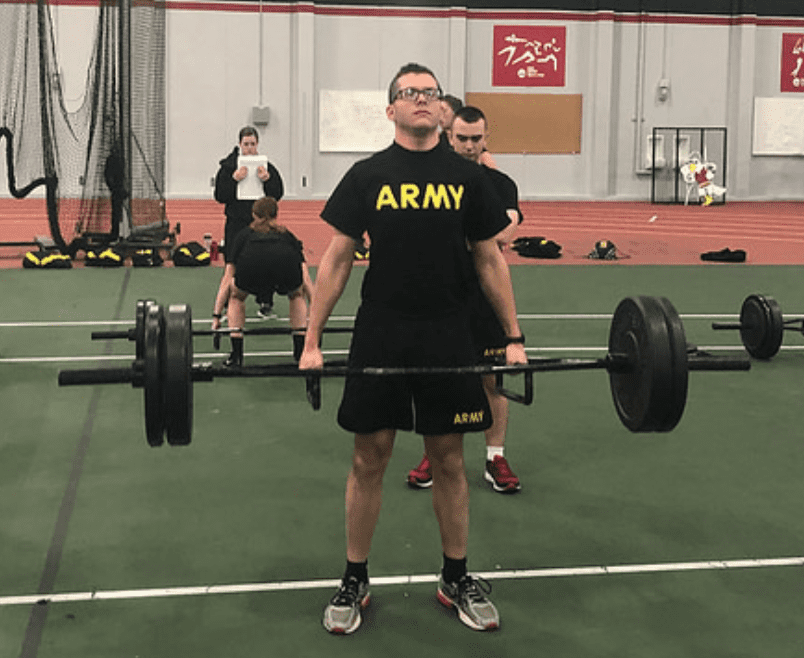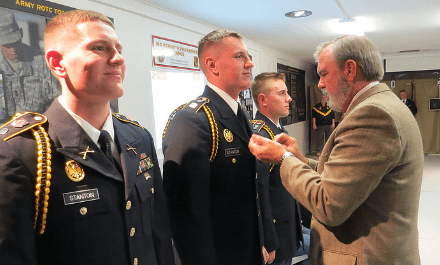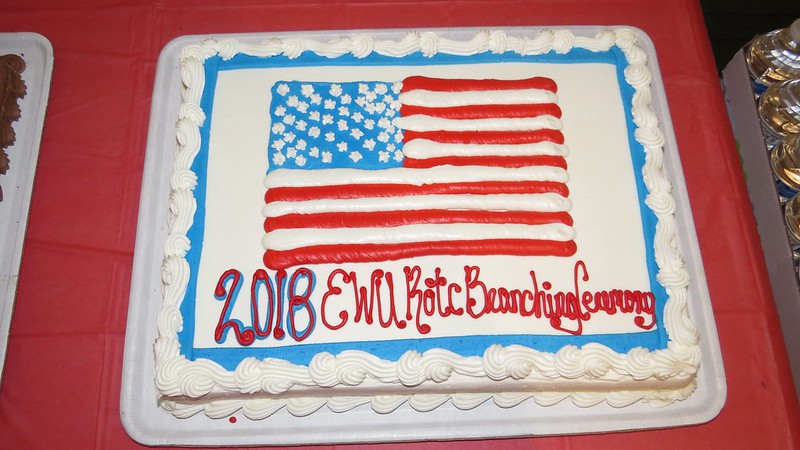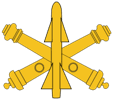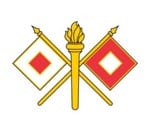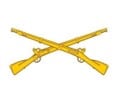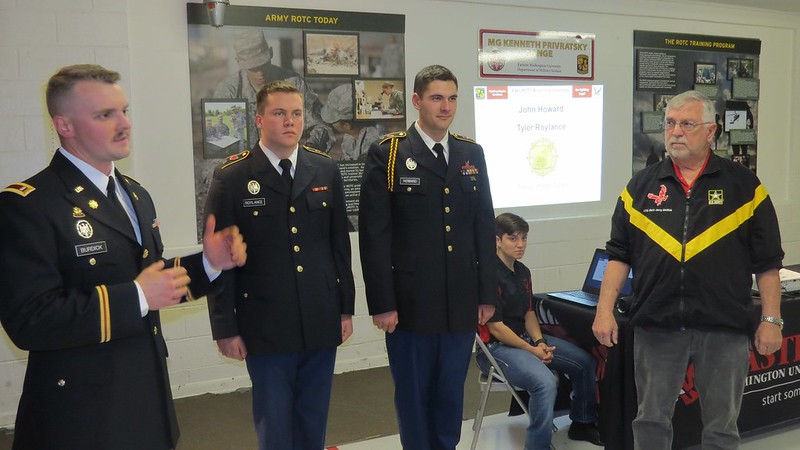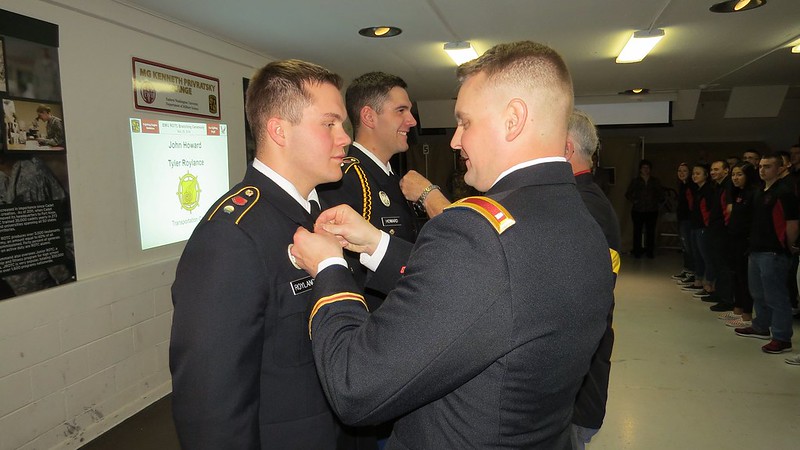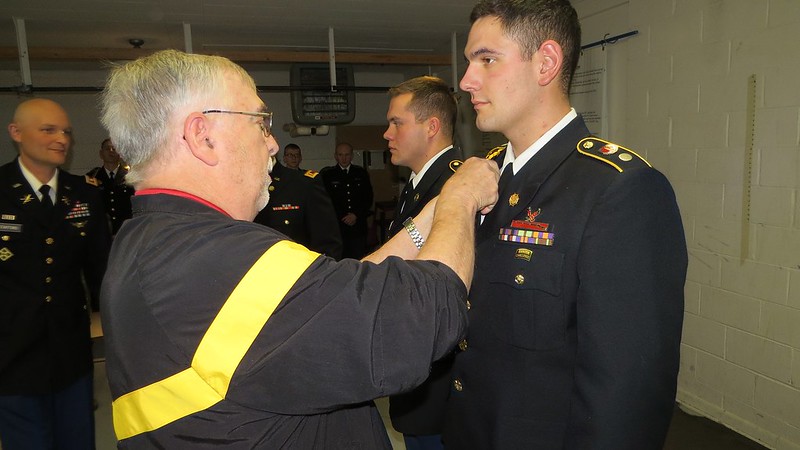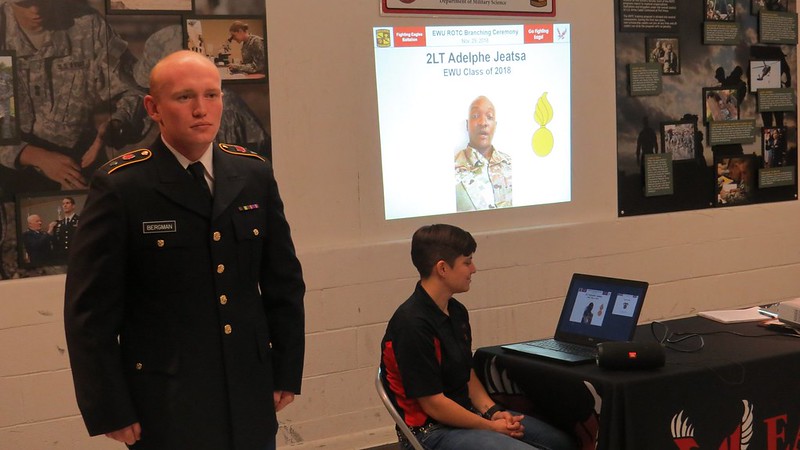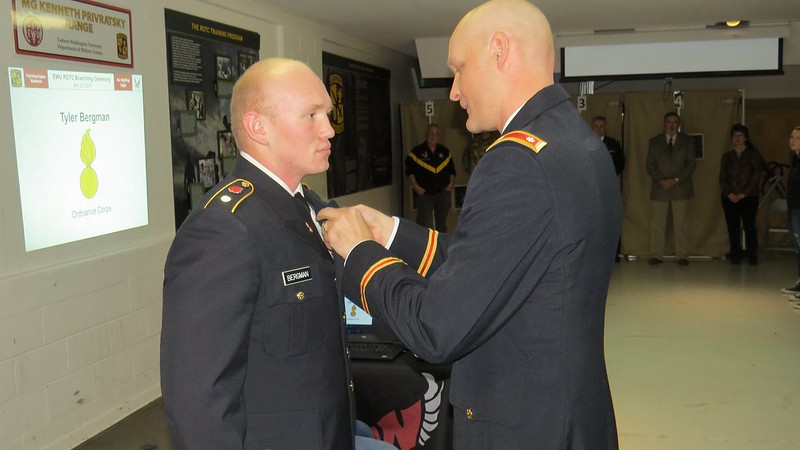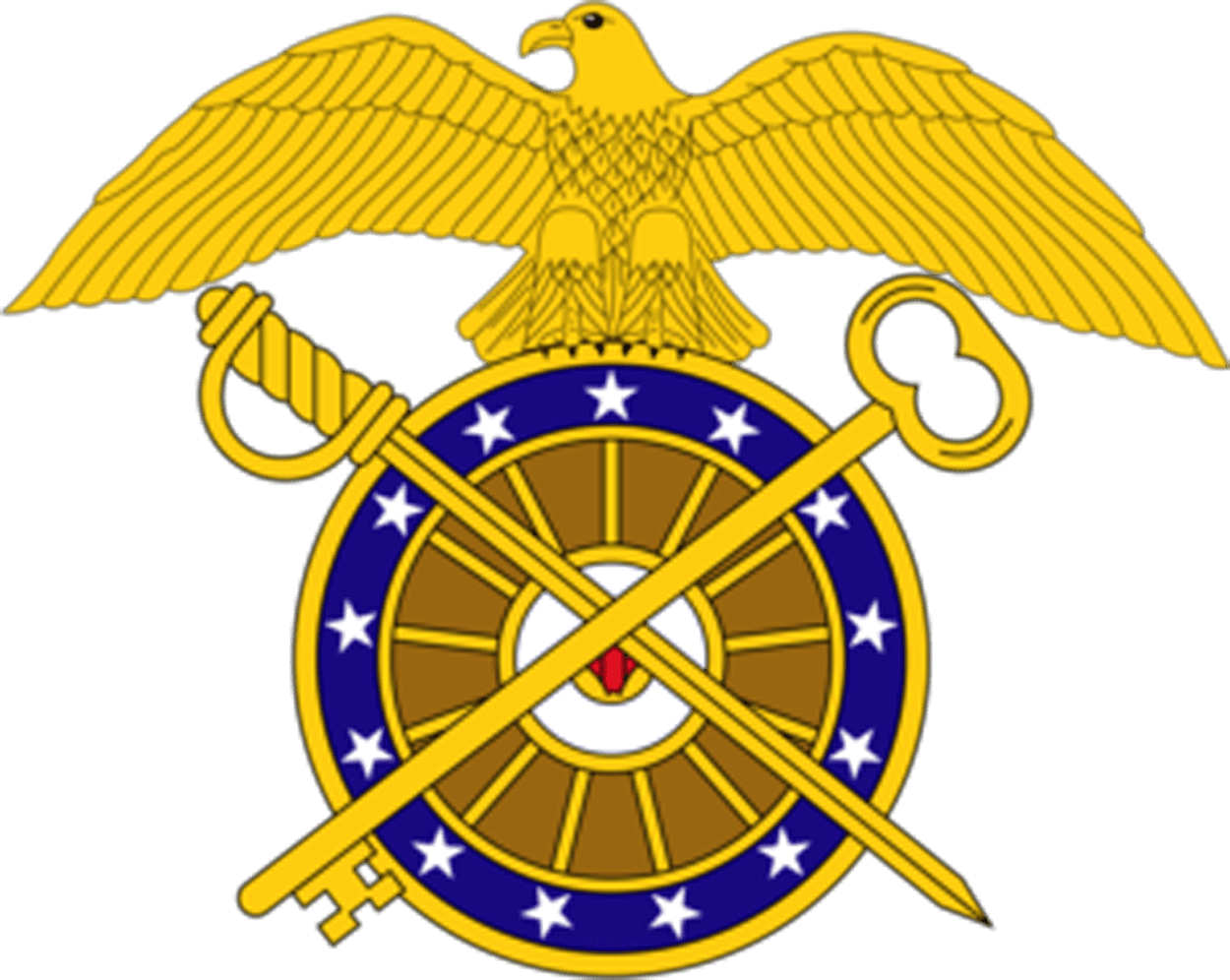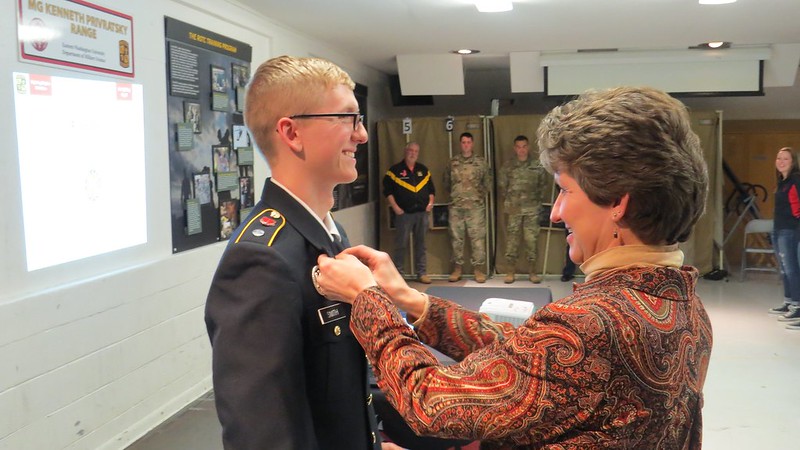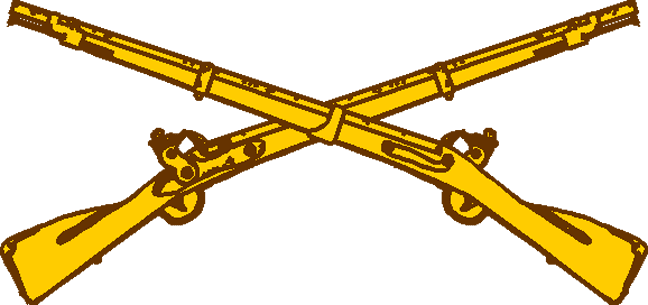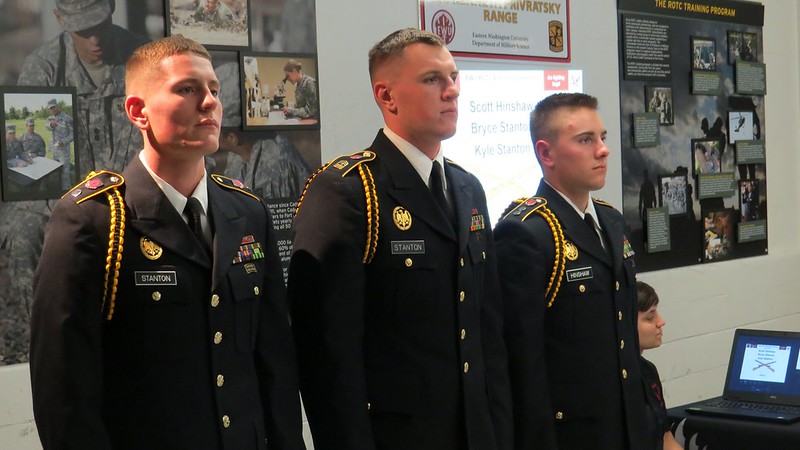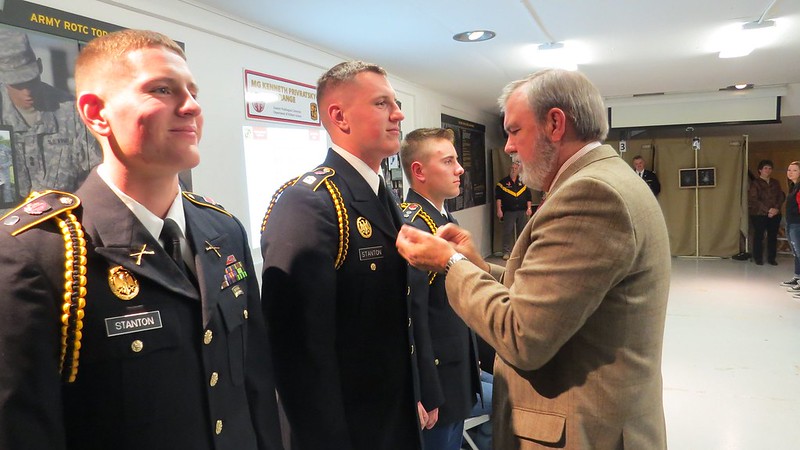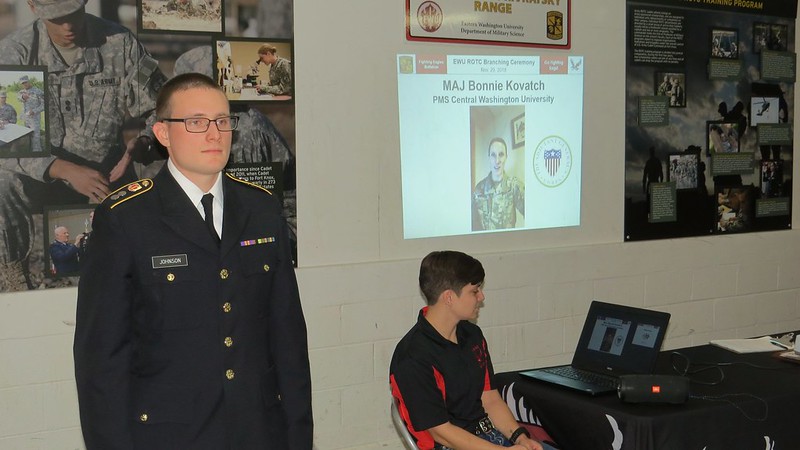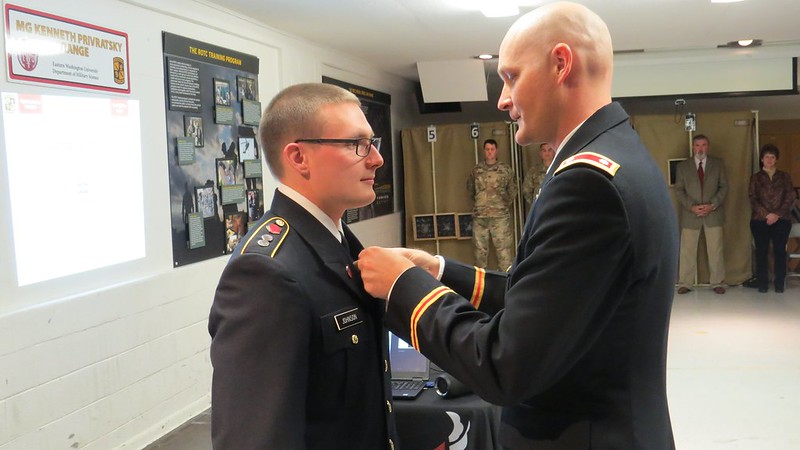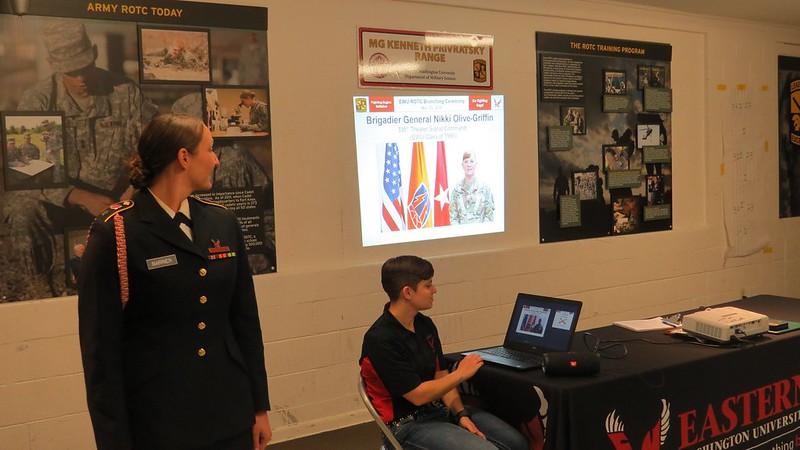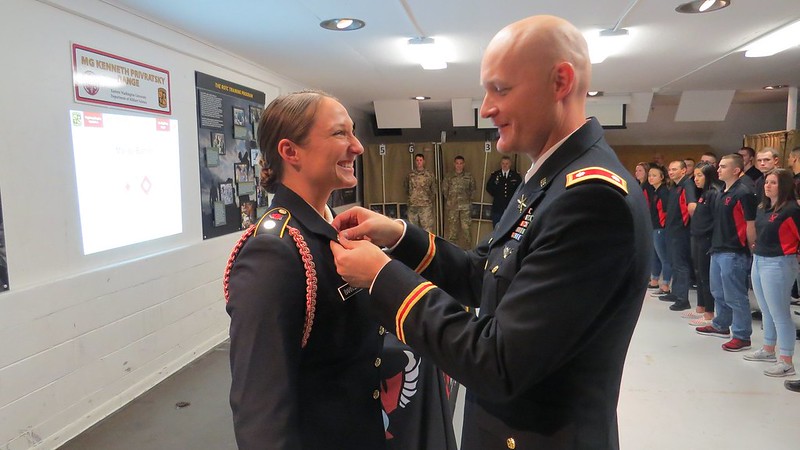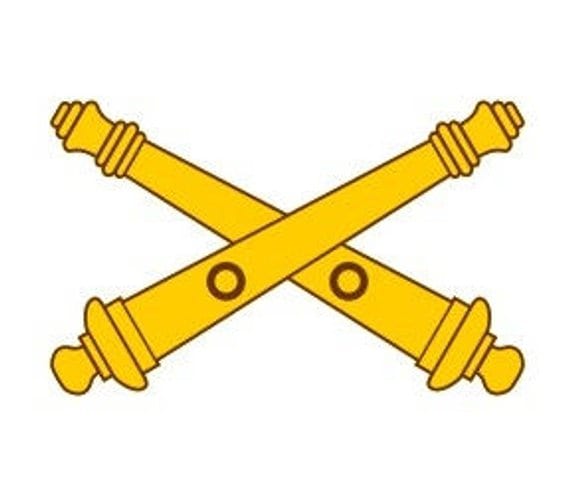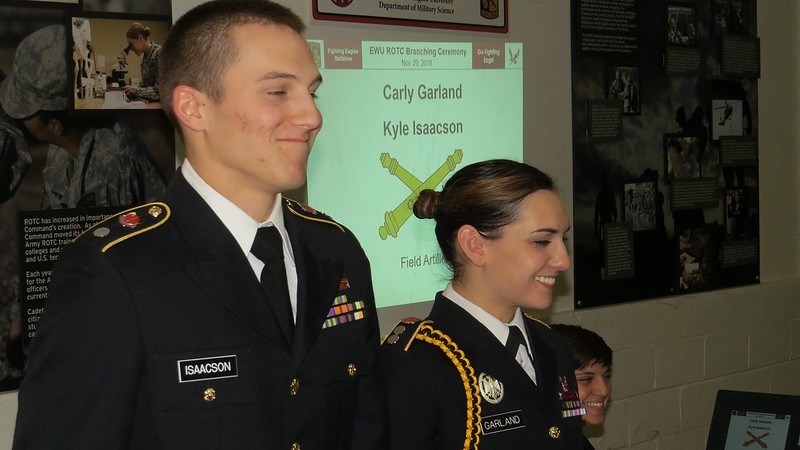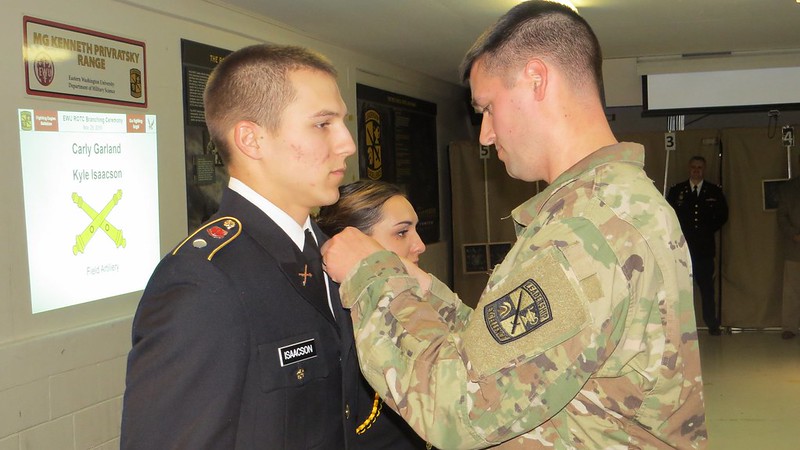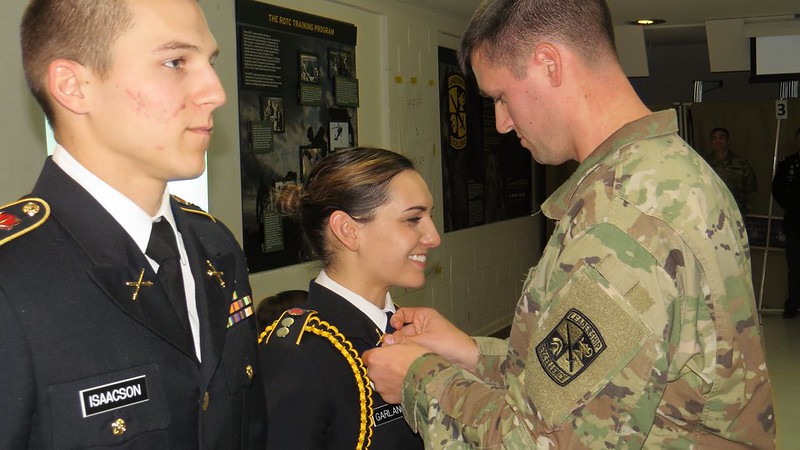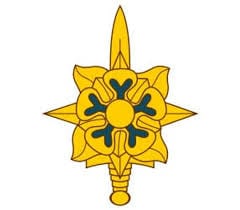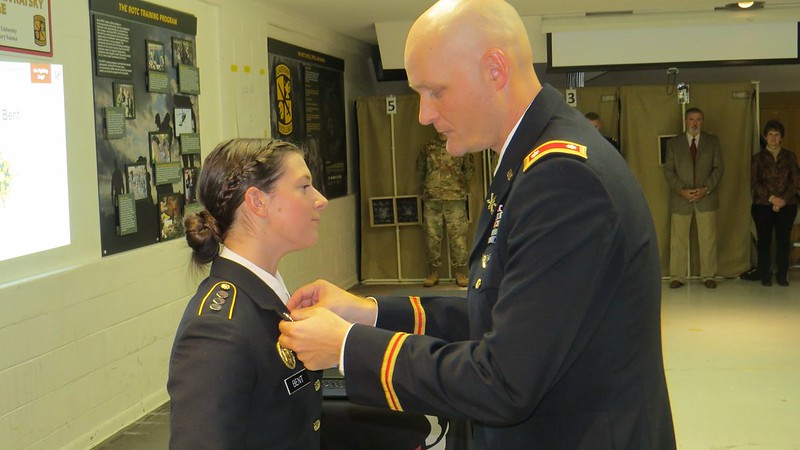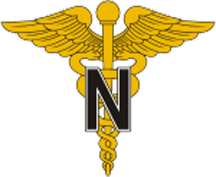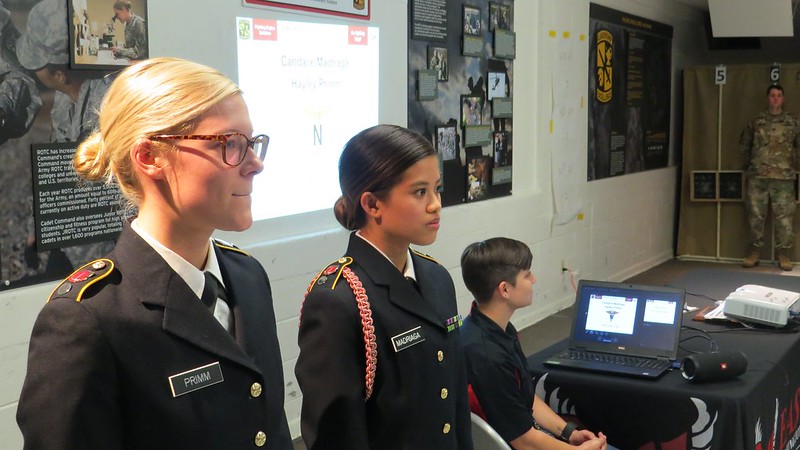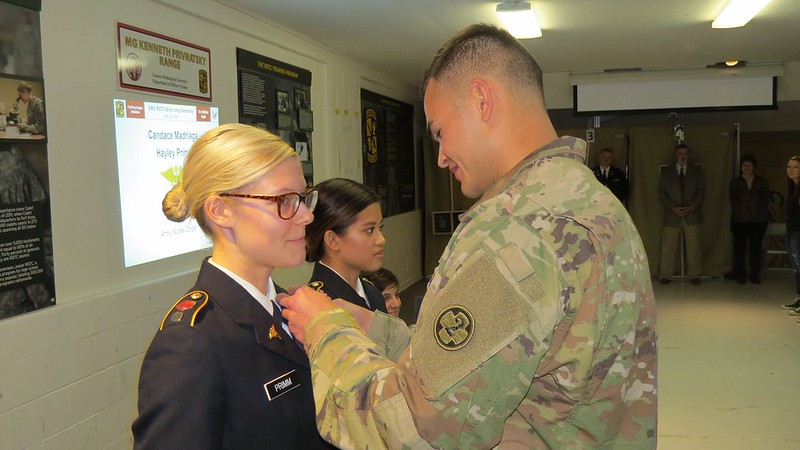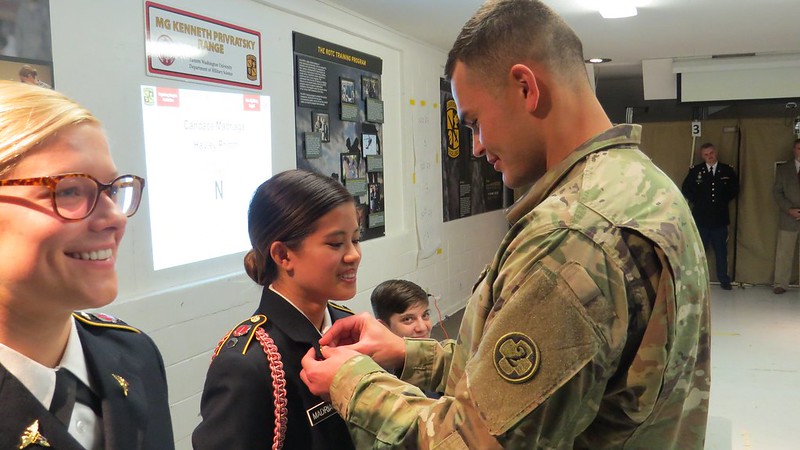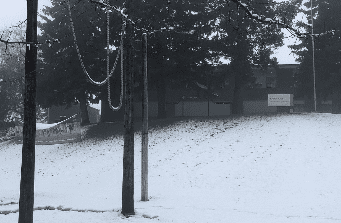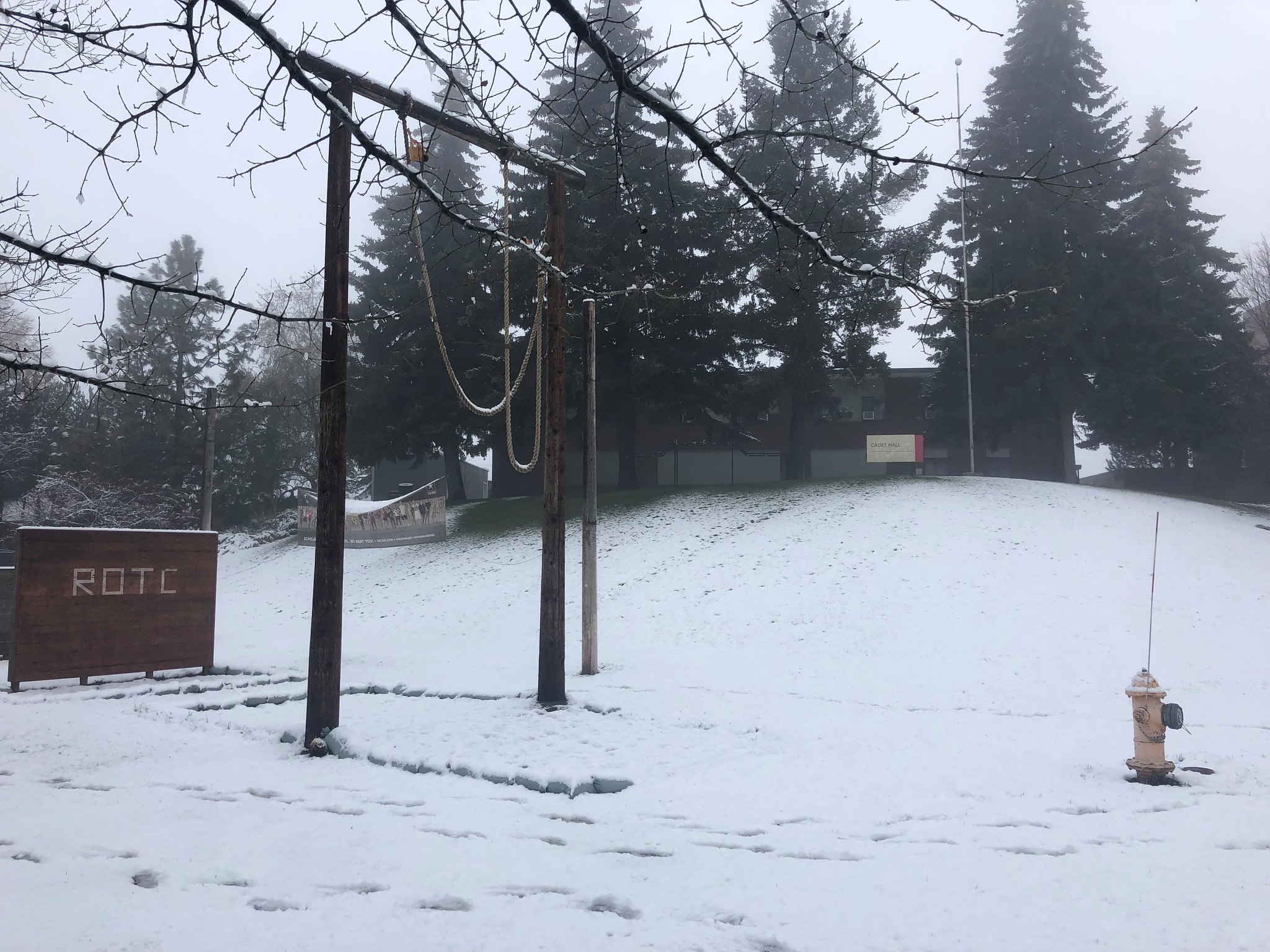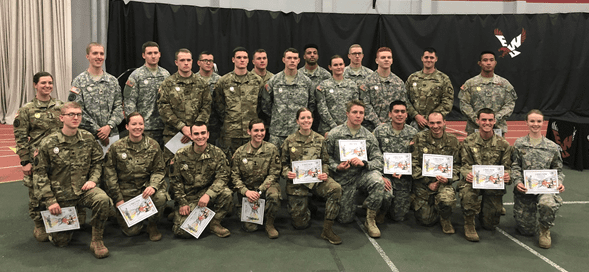Between 17-18 November 2018, Eastern Washington University (EWU) hosted its first ever German Armed Forces Proficiency Badge (GAFPB) test. The test was sponsored by the EWU Reserve Officer Training Corps (ROTC), Fighting Eagles Battalion and drew 167 participants to the university to attempt to earn the highly coveted GAFPB. The participants were mix of ROTC Cadets, active duty personnel, National Guardsmen, and Reservists from across the states of Washington and Idaho. Testing for the GAFPB actually began at each unit’s home station where each participant had to successfully complete first aid and Chemical, Biological, Radiological, & Nuclear (CBRN) testing. The participants that successfully past these events then traveled to EWU campus to complete the remaining evaluated events.
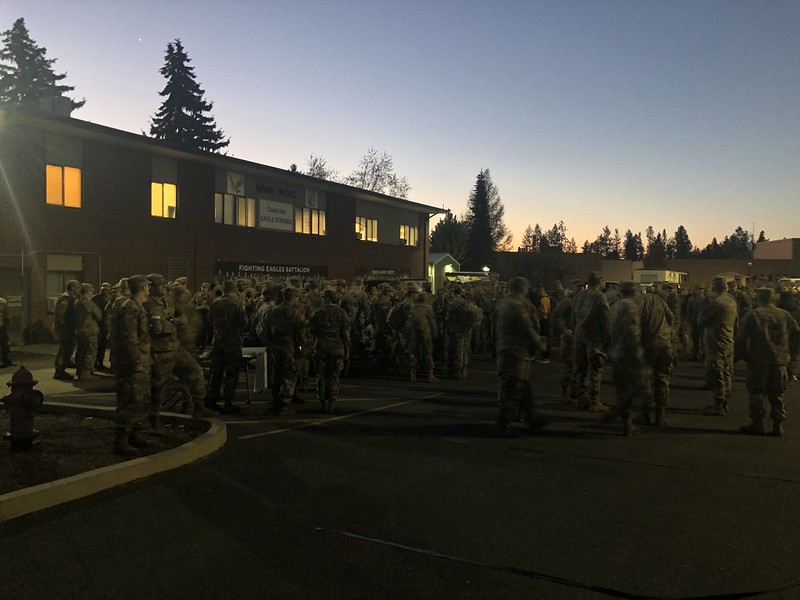
In the early morning hours, GAFPB participants gather in front of Cadet Hall on the campus of Eastern Washington University.
The lead evaluator for the GAFPB test was Sergeant Major Ronald Schiller a German Army exchange officer stationed at Ft. Lee, Virginia. With sponsorship from the EWU ROTC alumni, Sergeant Major Schiller and his wife Katie were able to come Cheney to oversee the event.
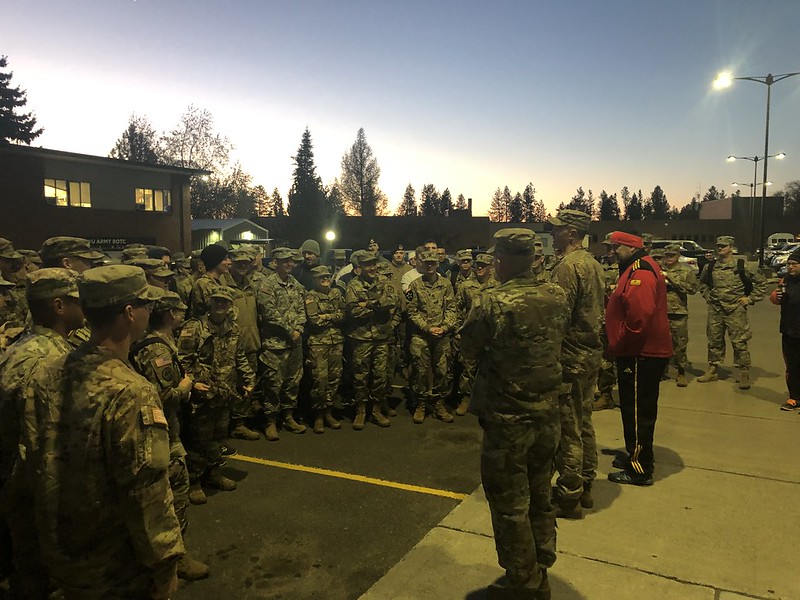
EWU ROTC Assistant Professor of Military Science Greg Benjamin and German Sergeant Major Ronald Schiller address the participants before the start of the GAFPB testing.
The 100-Meter Swim Test
After an early morning event registration period, the participants began the GAFPB competition with the 100-meter swim test in full uniform. The swim test was held in the EWU Aquatics Center and supported by register lifeguards. The 100-meter swim test had to be completed in 4 minutes. After completing the swim the participants then had to tread water and remove their uniform and throw it completely out of the pool. If they lost control of their uniform and it dropped to the bottom of the pool they were disqualified. The swim test proved to be the most difficult event of the GAFPB testing since it eliminated the most participants.
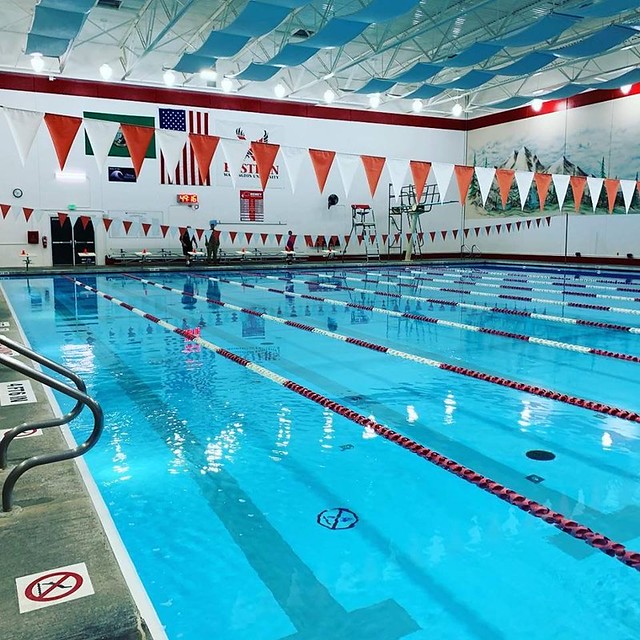
The EWU Aquatics Center (picture from SGT Timothy Bowes)
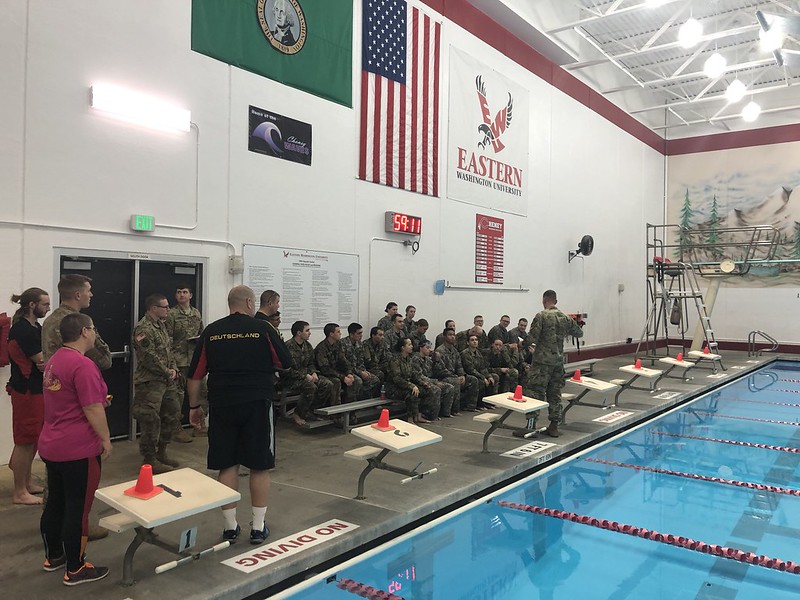
GAFPB participants receive briefing before conducting the swim test in the EWU Aquatics Center.
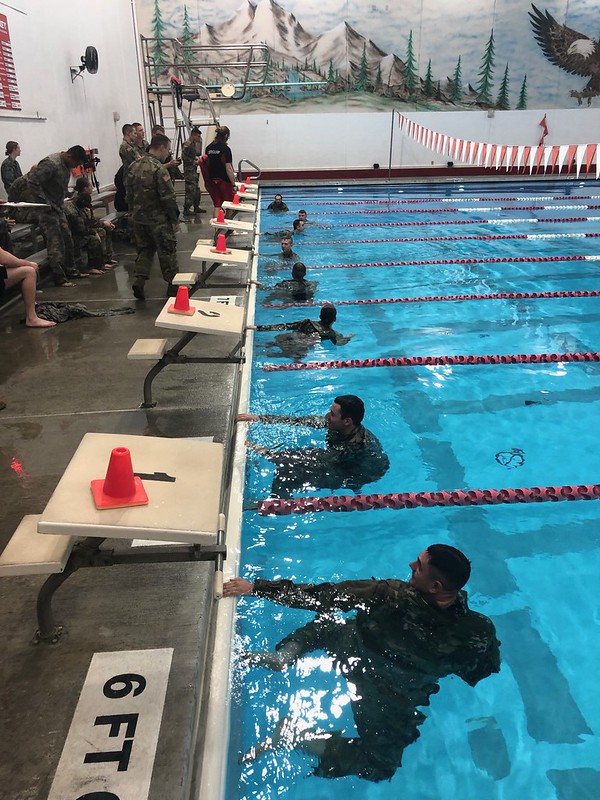
GAFPB testing participants are ready to start the swim test.
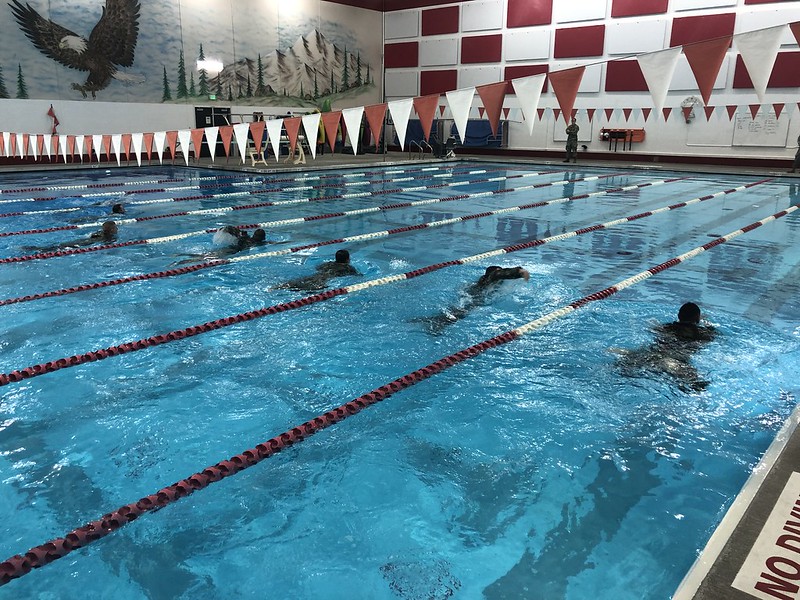
GAFPB testing participants conduct the 100-meter swim test.
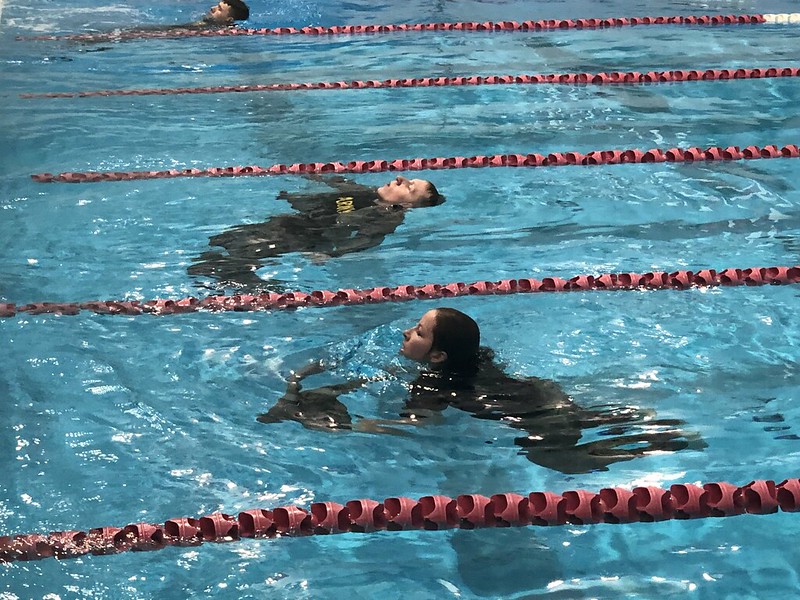
EWU ROTC Cadets Jameson Palmer (top) and Samantha (bottom) tread water as they remove their uniform.
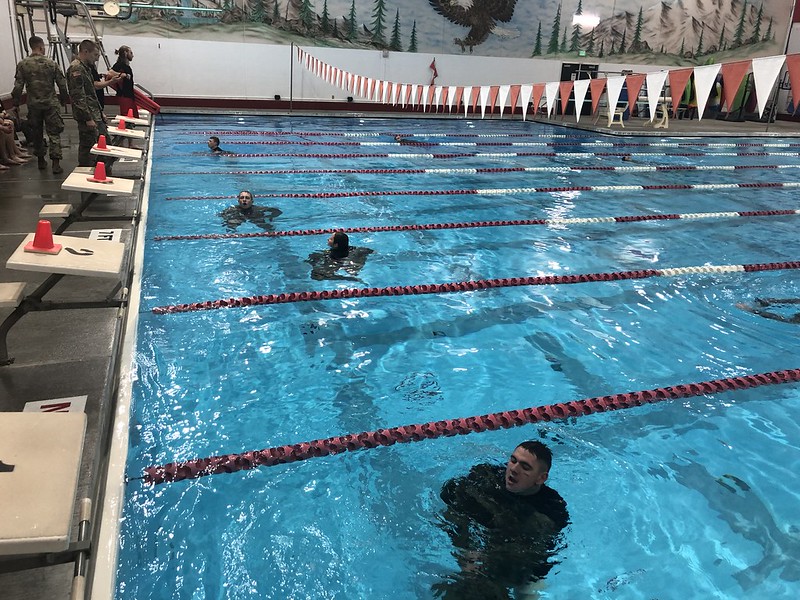
EWU ROTC Cadet John Howard treads water as he removes his uniform.
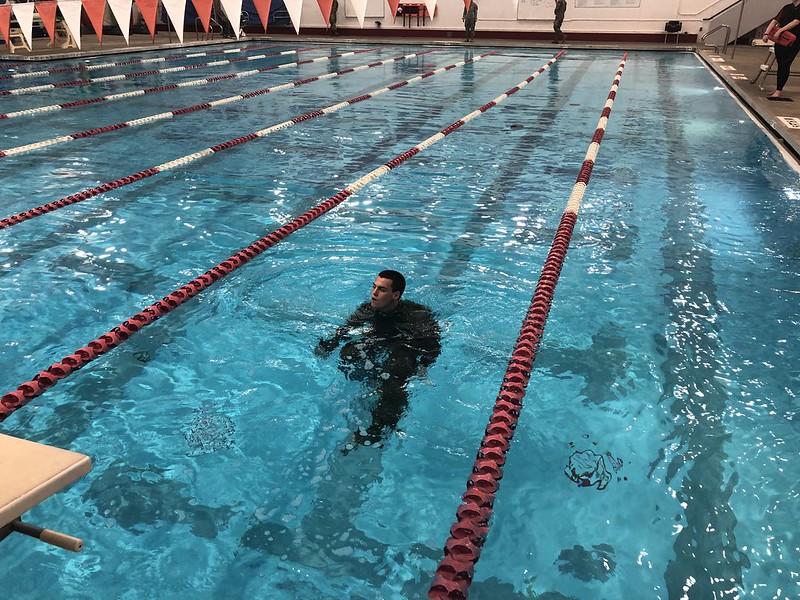
EWU ROTC Cadet Thomas Luce treads water as he removes his uniform.
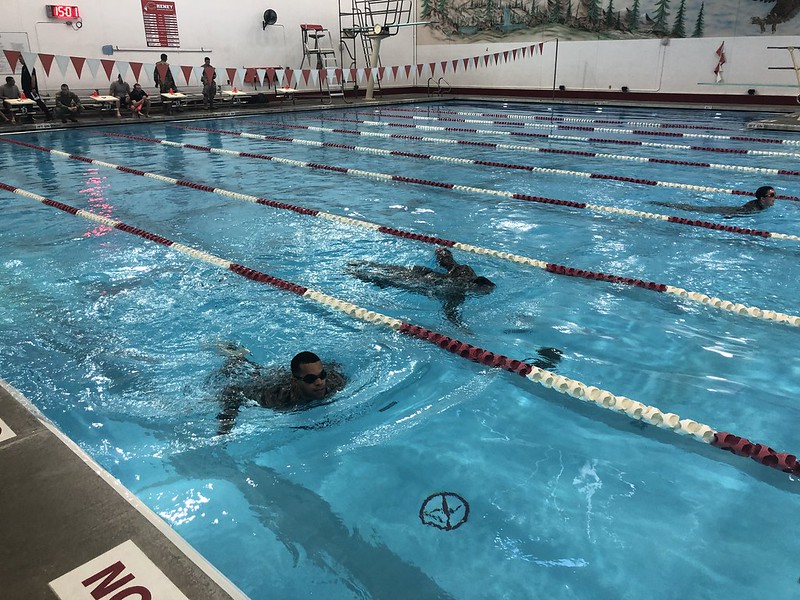
Airmen from Fairchild AFB compete in the 100-meter swim test.
The Basic Fitness Test
Following the swim test the participants then changed their clothes to execute the basic fitness test portion of the GAFPB test. The basic fitness test was held in the EWU Fieldhouse which is an indoor multiuse facility with its own indoor track. For the fitness portion of the test, each participant had to pass three events, a shuttle sprint, flexed arm hang, and 1000-meter run. The times received for each event were averaged to determine if the participant passed. Additionally different overall scores determined if the participant would receive a Gold, Silver, or Bronze GAFPB.
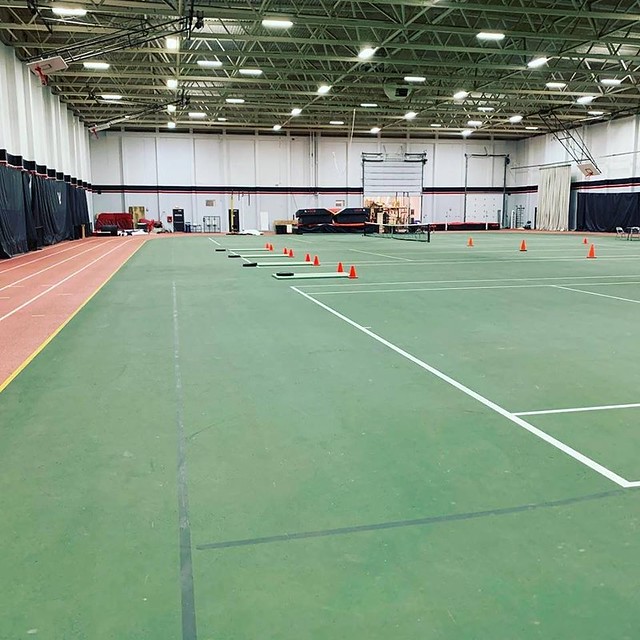
The EWU Fieldhouse (Picture from SGT Timothy Bowes).
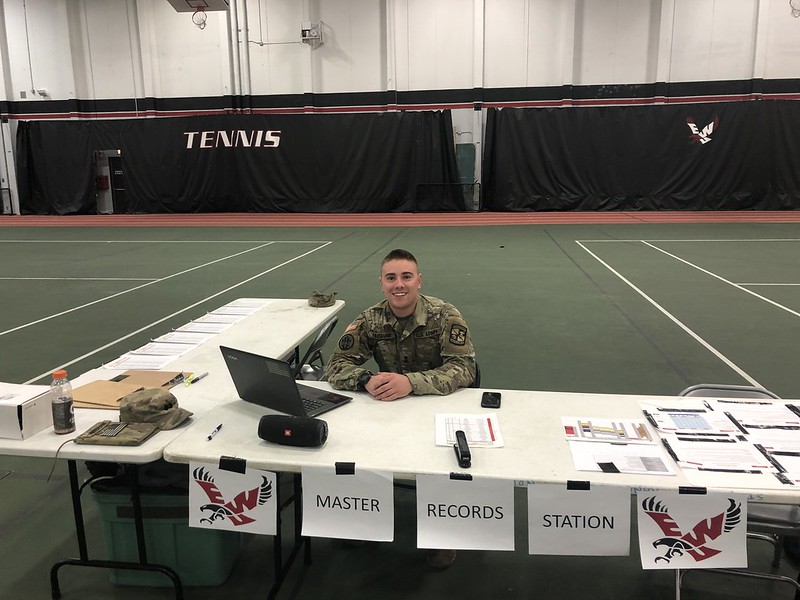
Cadet Scott Hinshaw the lead Cadet Officer in Charge (OIC) of GAFPB testing mans the master scorer’s desk located inside the EWU Fieldhouse.
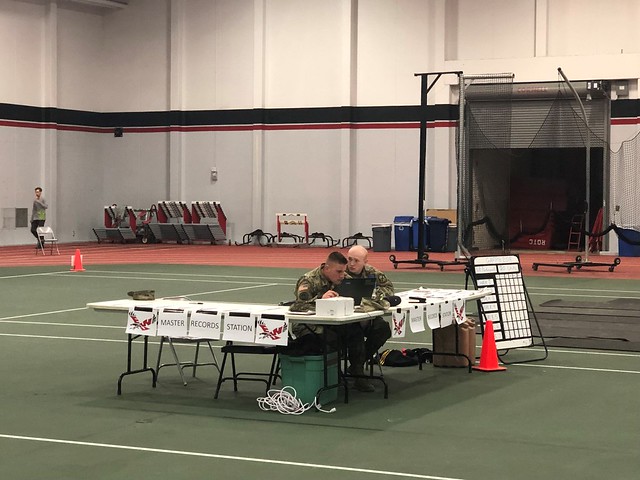
Cadets Scott Hinshaw and Tyler Bergman work the master scorer’s desk that provided up to the minute updates on scoring to each participant.
The 11×10 Meter Shuttle Sprint
The first event of the basic fitness test was the 11×10 meter shuttle sprint. For the shuttle sprint each participant had to begin on the ground on a mat, get up and then sprint around a cone before sprinting back to the mat. Once back at the mat they had to drop to the ground again with their arms behind their back and then get back up and sprint around the cone. The event was complete after the participant passed the cone for the sixth time.
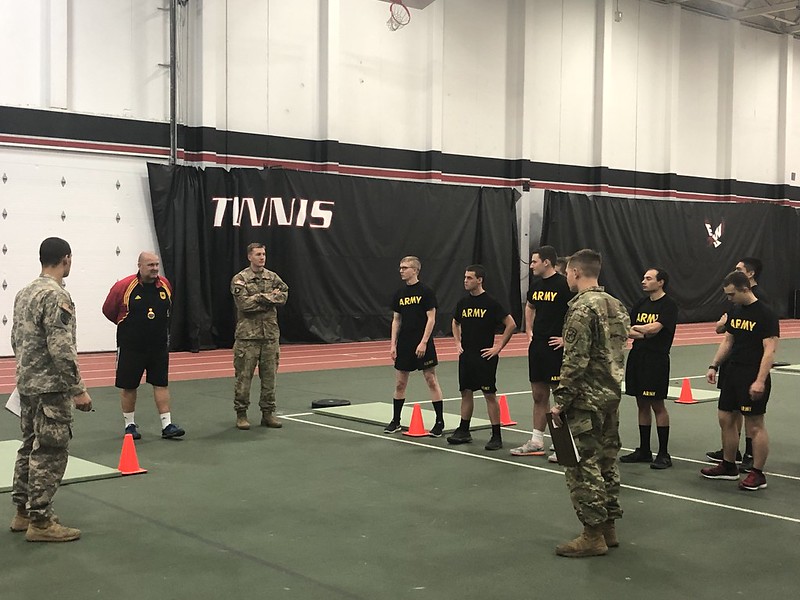
Sergeant Major Schiller briefs the participants on the shuttle sprint event inside the EWU Fieldhouse.
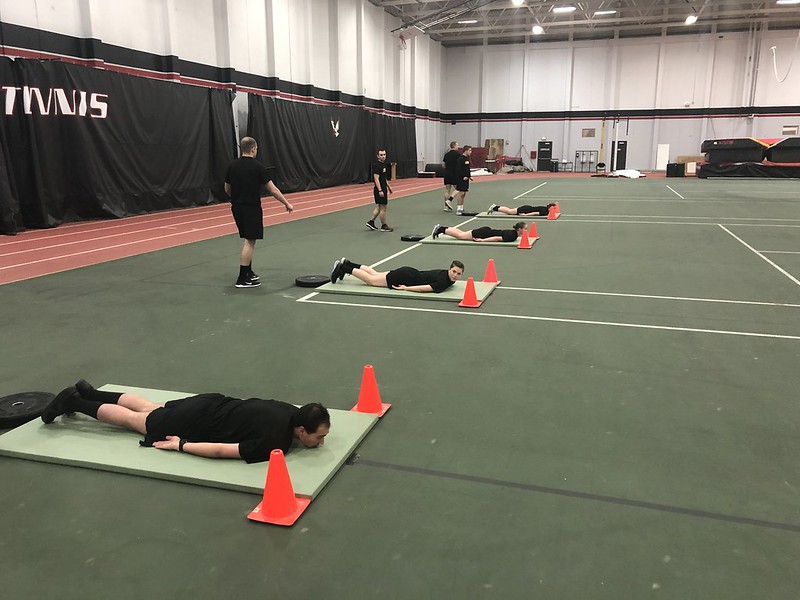
Shuttle sprint participants begin facing down on the mats.
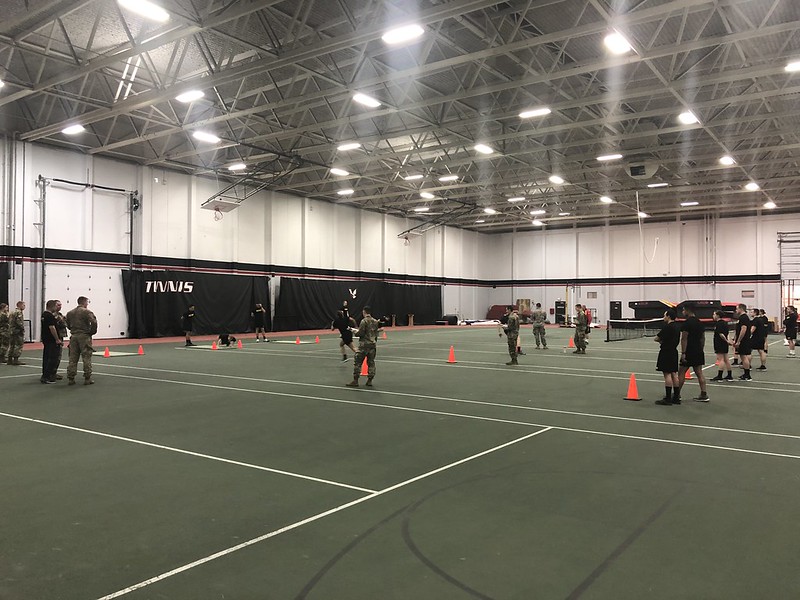
Participants conduct the 11×10 meter shuttle sprint in the EWU Fieldhouse.
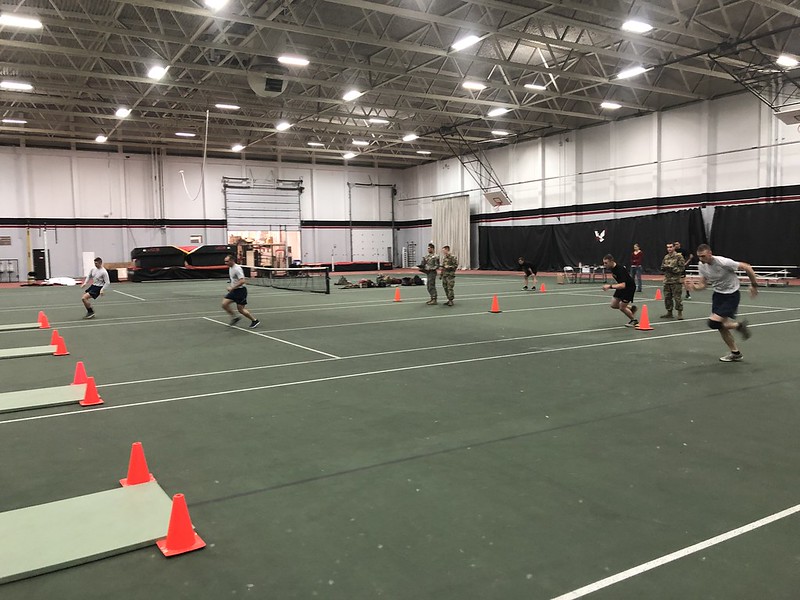
Airmen and Soldiers conduct the 11×10 meter shuttle sprint.
The Flexed Army Hang Event
After a five minute rest period, the participants then had to conduct the flexed arm hang. The participants had to keep their chin above the pull up bar for as long as possible. If their chin touched or went below the bar the time stopped. The longer a participant held their chin above the bar, the more points they received.
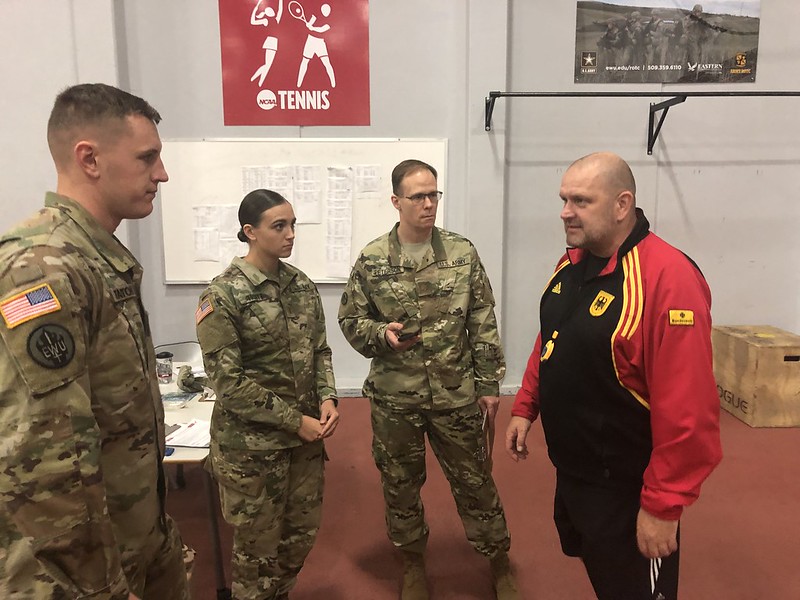
SGM Schiller (left) briefs the evaluators for the flexed arm hang event. From left: Cadet Bryce Stanton, 2nd Lieutenant Rebecca Trout, and Major Michael Peterson.
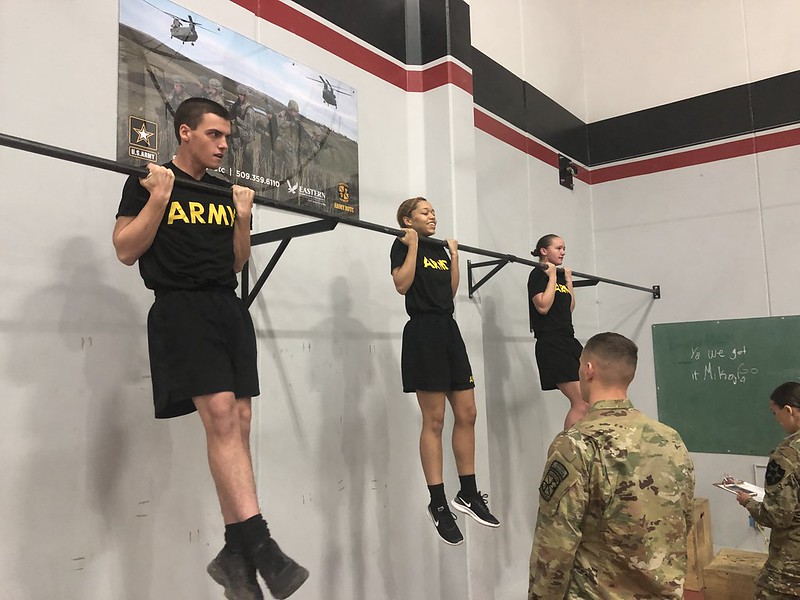
From left, EWU ROTC Cadets Thomas Luce, Amayia Roberts, and Megan Anderson conduct the flexed arm hang event.

A Sailor and Cadets conduct the flexed arm hang event.

EWU ROTC Cadet Nicholas Null conducts the flexed arm hang event.

EWU ROTC Cadet Adam Burnside conducts the flexed arm hang event.
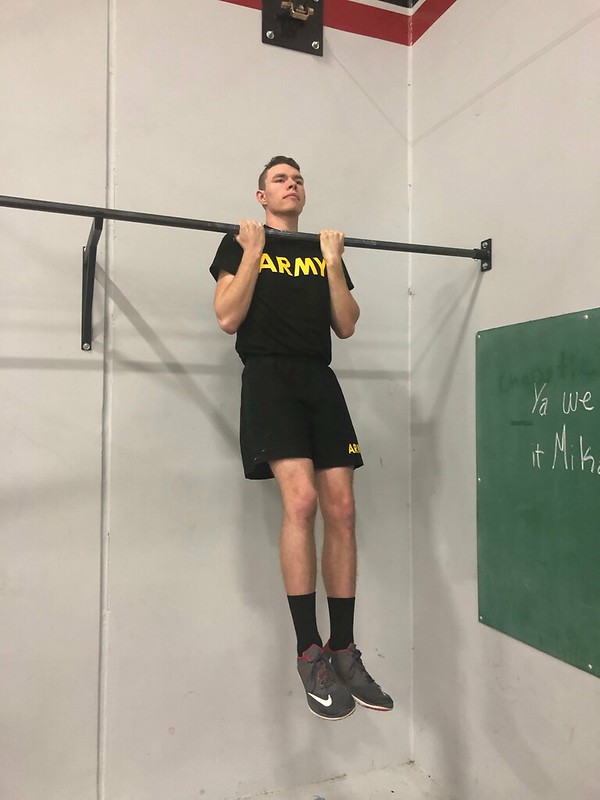
Cadet Liam Hewey conducts the flexed arm hang event.
The 1,000-Meter Run
After completing the flexed arm hang event, the participants next conducted a 1,000-meter run. For the 1,000-meter run eight participants at a time had to run 5-laps around the Fieldhouse’s indoor track. The evaluators provided by the EWU ROTC battalion track the number of laps and recorded the time for the participants.
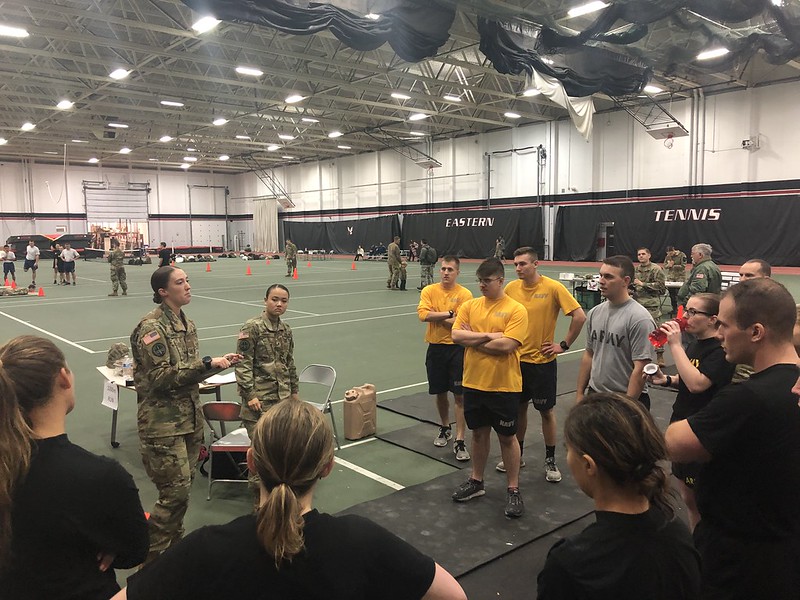
Cadets Megan Anderson (left) and Cheyenne Sweet (right) briefs sailors, soldiers, and Cadets on the standards for the 1,000-meter run event.
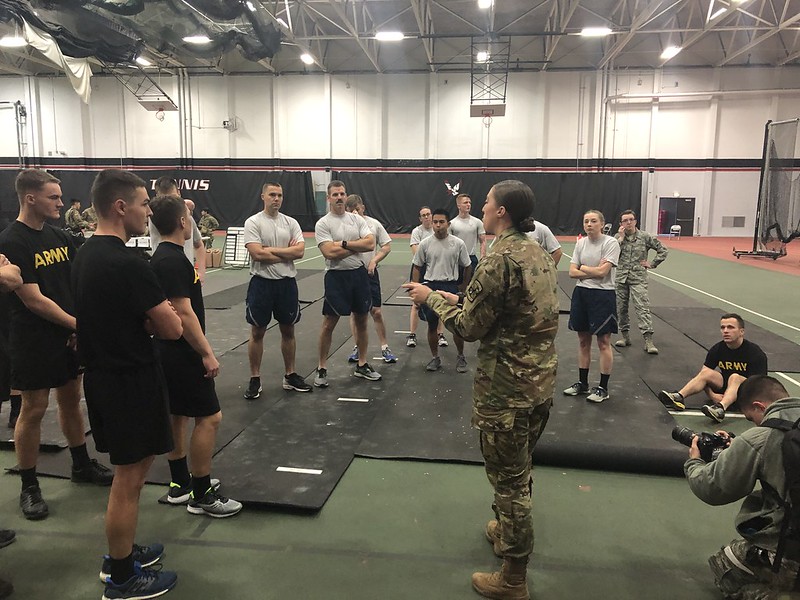
Cadet Megan Anderson briefs Soldiers and Airmen on the standards for the 1,000-meter run.
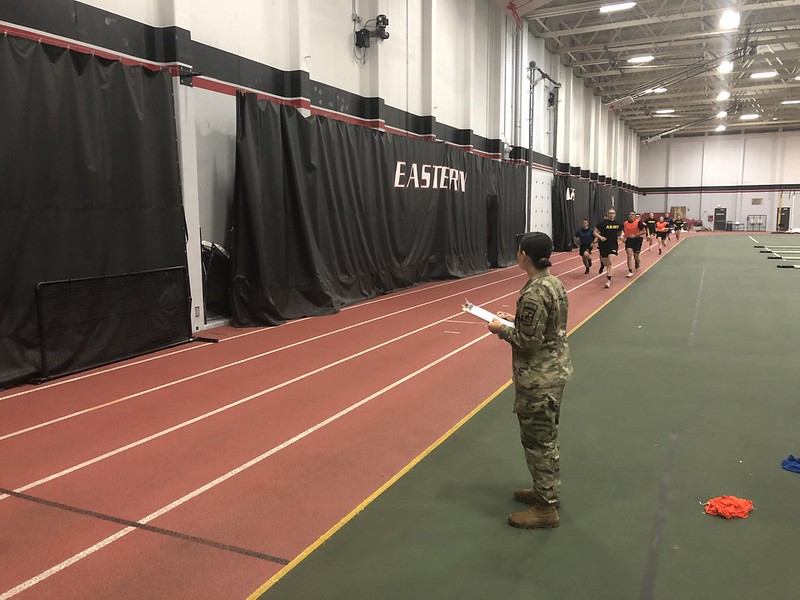
EWU ROTC Cadet Cheyenne Sweet evaluates participants as they conduct the 1,000-Meter Run event.
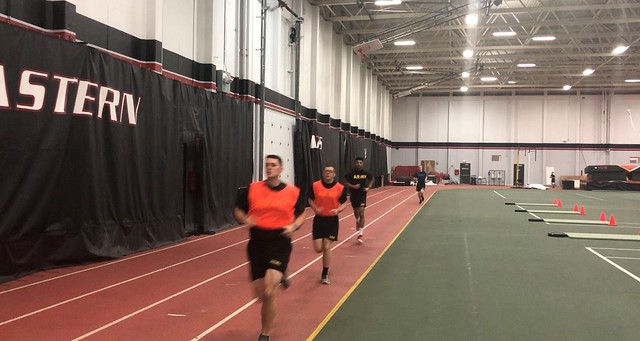
EWU Cadre member Captain Nicholas Carbaugh conducts the 1,000-Meter Run.
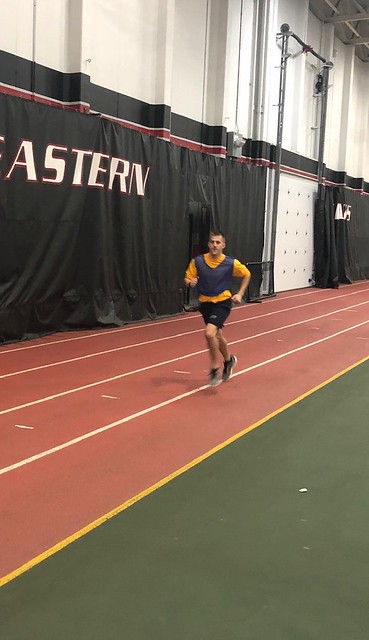
US Navy Sailor, PO3 Travis Rathe conducts the 1,000-Meter Run.
Pistol Qualification
After the completion of the basic fitness test the participants once again changed clothes into their duty uniforms to conduct the pistol qualification event. The pistol qualification event was conducted at the Medical Lake Department of Corrections Range. For the pistol qualification the participants had to successfully engage three targets located 20-meters away with five rounds loaded in the M9 pistol. Three hits on the three targets was a Bronze score, four hits on the three targets was a Silver score, and 5 hits on the three targets was a Gold score. After the completion of the pistol qualification event each participant was released for a mandatory rest period to prepare for the ruck march scheduled for the next morning.
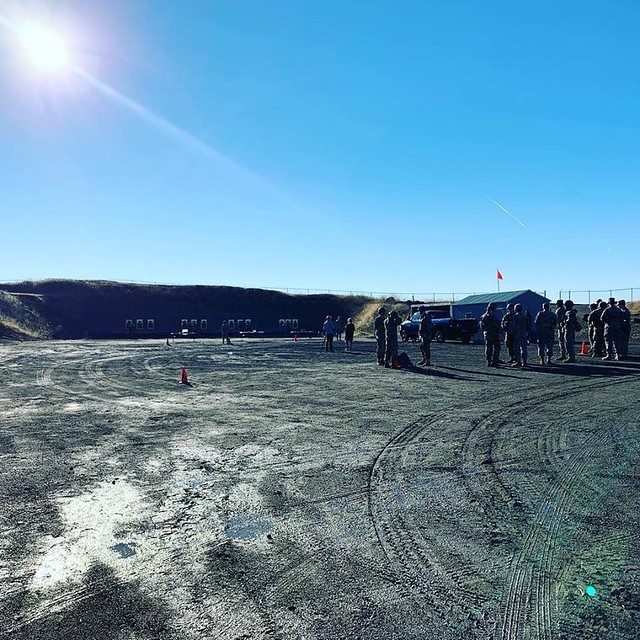
The Medical Lake Department of Corrections Range (Photo by SGT Timothy Bowes).

Participants inspect their targets at the pistol qualification range (Photo by SGT Timothy Bowes).
Ruck March
In the early morning hours the GAFPB participants staying in the EWU Cadet Hall had an early wakeup call to prepare for the ruck march that morning. For the ruck march event each participant had to carry 35 pounds of weight at different distances based on their performance the previous day. For the participants still in the running for a Gold badge they had to march 12 kilometers (7.46 miles) in 120 minutes or less. The participants in the running for the Silver badge had to march 9 kilometers (5.6 miles) in 90 minutes or less. The participants still in the running for the Bronze badge had to march 6 kilometers in (3.75 miles) in 60 minutes or less. The ruck march course took the participants on a tour around the beautiful EWU campus.
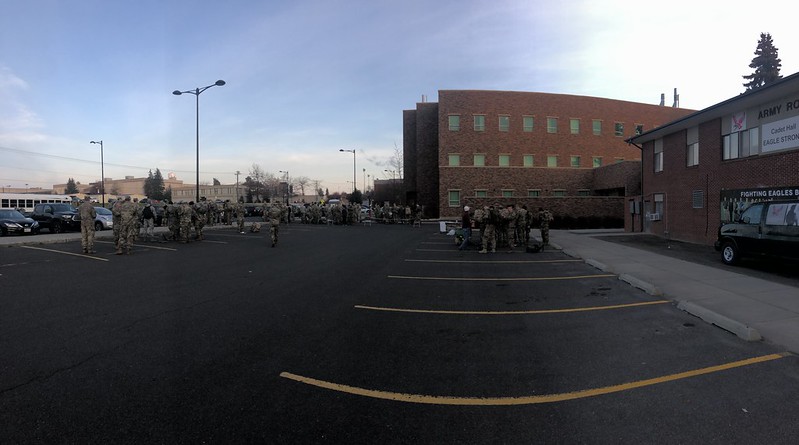
Participants prepare their gear in below freezing temperatures in the early morning hours in front of Cadet Hall.
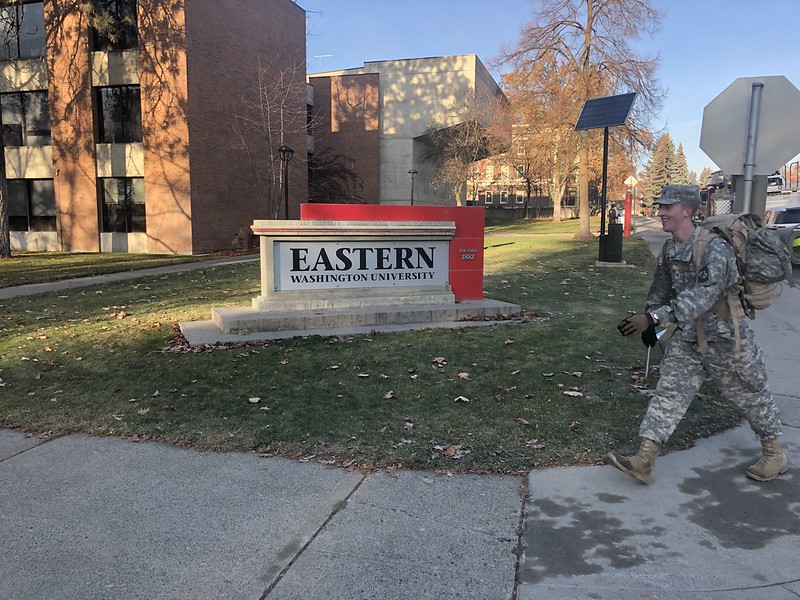
EWU ROTC Cadet Matthew Jeffs ruck marches by one of the entrance signs to Eastern Washington University.

Washington Army National Guard recruiter Timothy Bowes ruck marches along side EWU ROTC Cadet Liam Hewey around the EWU campus.

A soldier from 4-23 Infantry from Joint Base Lewis-McChord ruck marches around the EWU campus with his unit’s guide on.

A group that included two Navy Sailors, an airmen, and two EWU ROTC Cadets ruck march around the EWU campus.

Airmen from the 92nd Security Forces Squadron at Fairchild Air Force Base participated in the GAFPB testing to include the Squadron Commander Major Joseph Schneider pictured on the right.

Gonzaga University Cadets participate in the ruck march event.
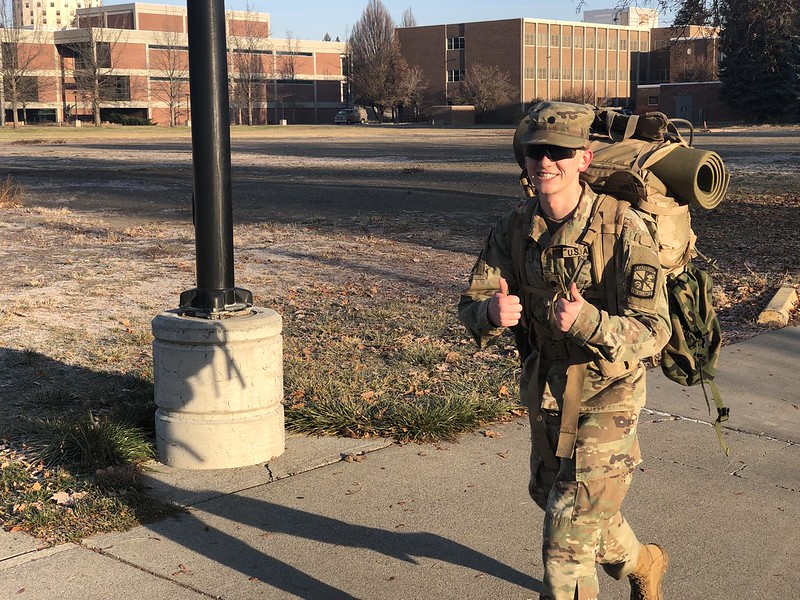
EWU ROTC Cadet Ryan Smith gives two thumbs up during the ruck march around the EWU campus.
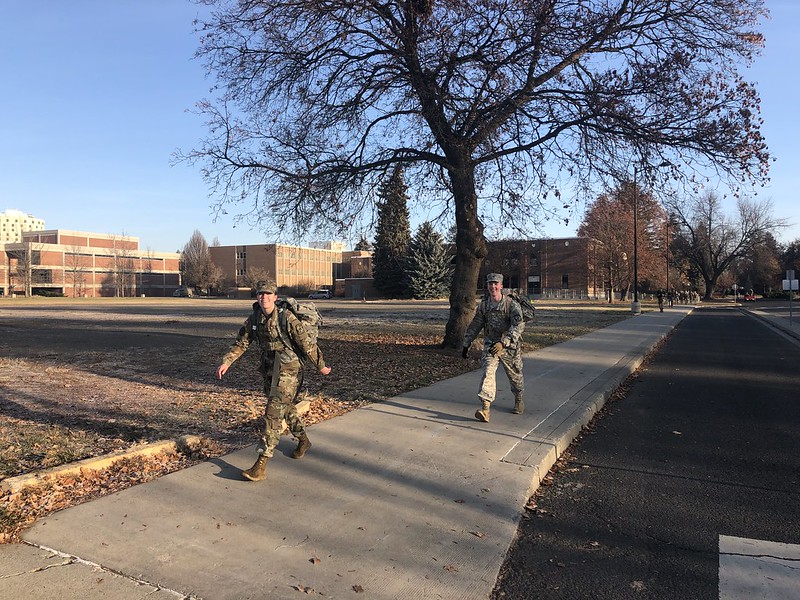
EWU ROTC Cadets Kylie Crooks and Matthew Jeffs are all smiles during the ruck march around the EWU campus.
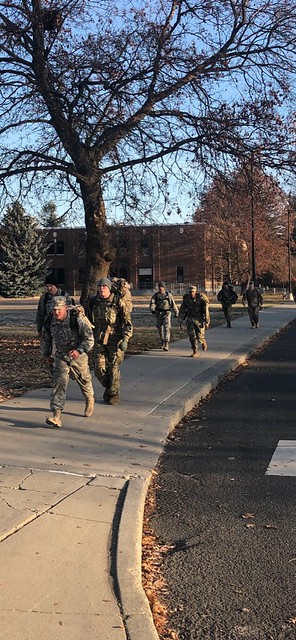
GAFPB participants ruck around the EWU campus.
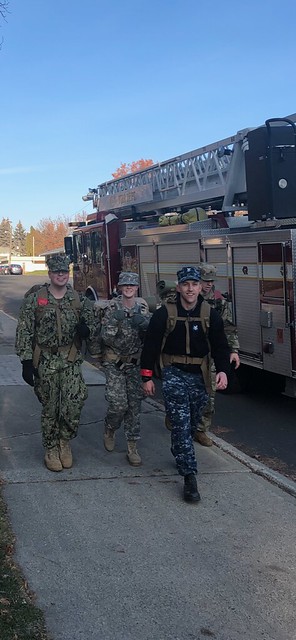
GAFPB participants ruck around the EWU campus.

EWU ROTC Cadets Austin Bristow, Ethan Smart, and Austin Pfennig participate in the ruck march event.
Award Ceremony
After the completion of the ruck march event the participants next attended the award ceremony to recognize those that had met the standard to be awarded a GAFPB. The award ceremony was held in the EWU Fieldhouse where friends, family, and alumni were all there to support the participants. In total 94 participants out of the initial 167 received a GAFPB. 35x Gold, 54x Silver, and 5x Bronze GAFPBs were awarded.
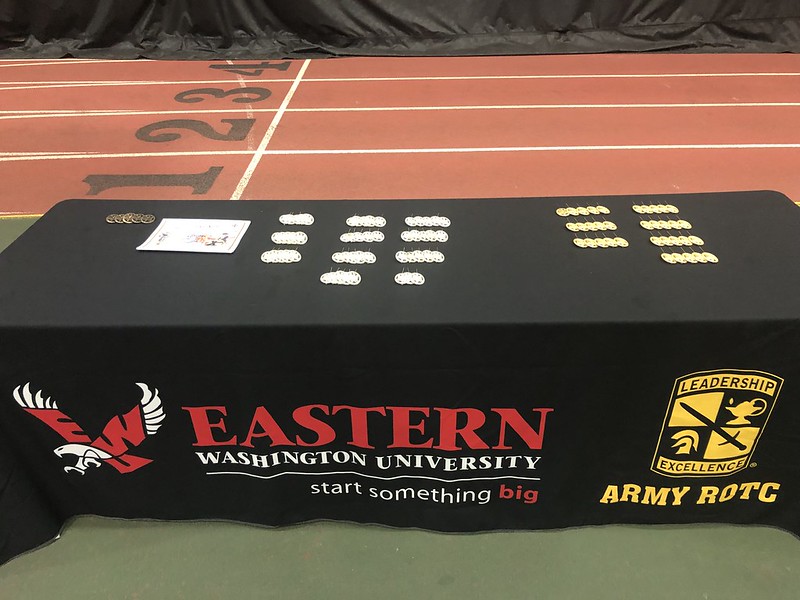
The German Armed Forces Proficiency Badges (GAFPB) are on the table ready to be awarded.
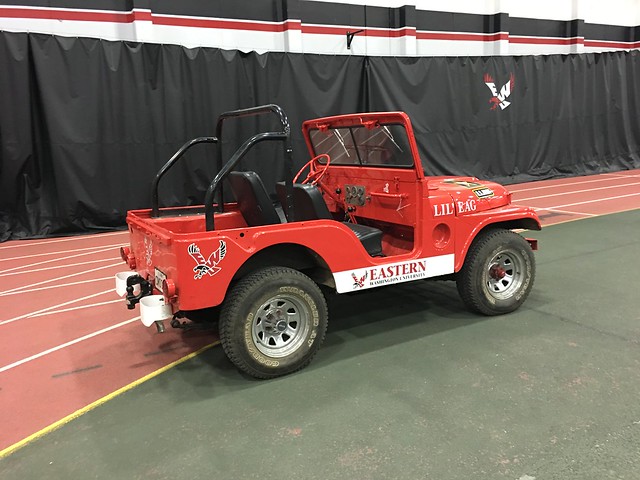
The EWU ROTC historic World War II Jeep named “Lil Eag” was on display for the award ceremony.
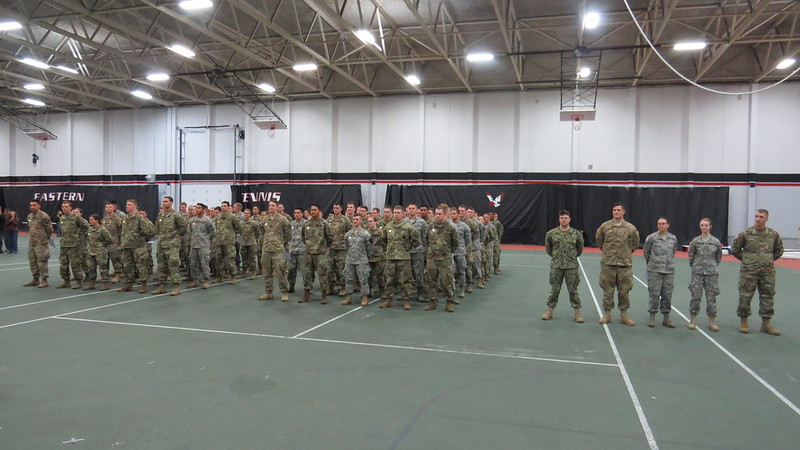
GAFPB awardees stand in formation in the EWU Fieldhouse.
Before awarding the GAFPB’s, Sergeant Major Schiller provided some motivational comments to all the participants and thanked the EWU alumni for sponsoring the event.
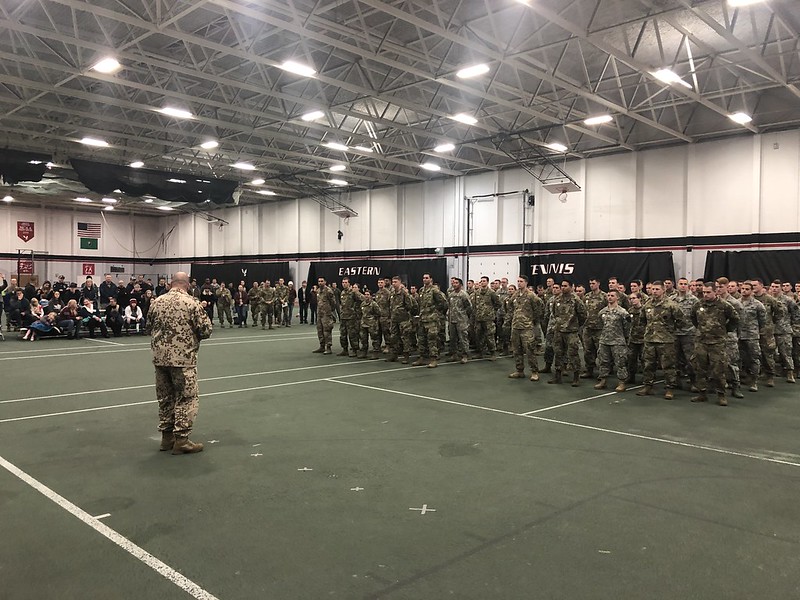
SGM Ronald Schiller addresses the crowd and GAFPB participants at the EWU Fieldhouse.
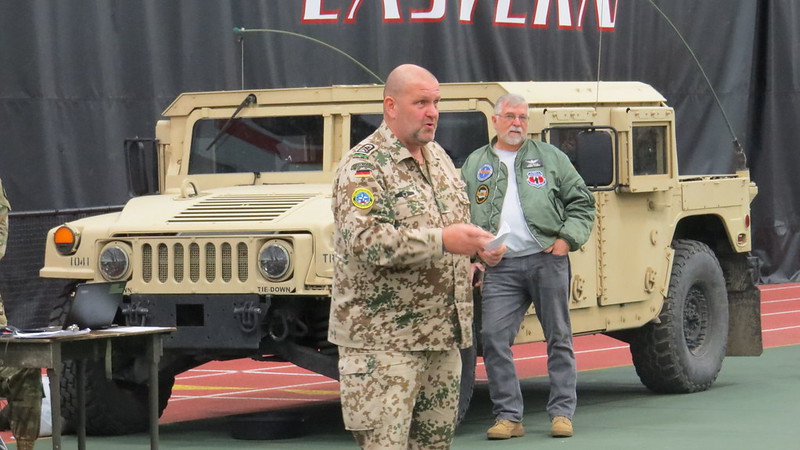
Sergeant Major Schiller addresses the crowd while backdropped by a HMMWV provided by the Washington Army National Guard for the award ceremony.
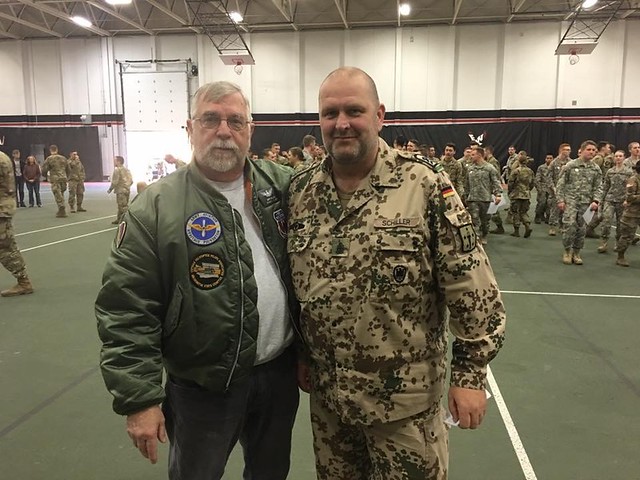
EWU ROTC Class of 1967 graduate, Lieutenant Colonel (R) Jerry Mellick (left) takes a picture with German Sergeant Major Ronald Schiller. Mr. Mellick representing the EWU alumni who helped sponsor the GAFPB testing also addressed the participants to let them know how impressed he was by everyone’s motivation and what they had accomplished.
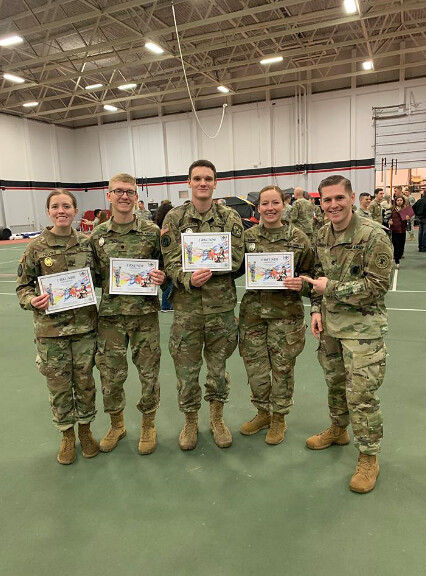
SFC Eddie Quimby (far right) a US Army Recruiter responsible for the Cheney area assisted EWU ROTC by serving as a GAFPB evaluator. SFC Quimby poses with EWU ROTC Cadets (from left) Kylie Crooks, Ryan Smith, Collin Galbreath, and Samantha Knight.
2018 German Armed Forces Proficiency Badge Awardees
| Gold GAFPB |  | Silver GAFPB |  | Bronze GAFPB |  |
| Name | Unit | Name | Unit | Name | Unit |
| CDT Thomas Luce | EWU | CDT Tyler Bristow | EWU | CDT Libby Glover | EWU |
| CDT Jameson Palmer | EWU | CDT Evan Jones | EWU | SGT Joshua Hedberg | SARC Office |
| CDT Nicholas Null | EWU | CDT Adam Burnside | EWU | SN Mitchell Statton | Navy |
| CDT Cesar Guzman | EWU | CDT John Howard | EWU | A1C Danielle Petika | 92nd Medical Group |
| CDT Devantae Hall | EWU | CDT Ethan Smart | EWU | SSG Justin Cartwright | A/341st |
| CDT Haley Bent | EWU | CDT Samantha Knight | EWU | | |
| CDT Kylie Crooks | EWU | CDT Ryan Smith | EWU | | |
| CDT Chad Triplett | EWU | CDT Joseph Jordan | EWU | | |
| CDT Jack Bowen | Univ. of WA | CDT Liam Hewey | EWU | | |
| CDT Robert Mitchell | Univ. of WA | CDT Matthew Jeffs | EWU | | |
| 2LT Vanessa Munro | Univ. of WA | CDT Tyler Roylance | EWU | | |
| CDT Taylor Polson | Univ. of WA | CDT Kaylie Watters | EWU | | |
| CDT Ian Zipp | Univ. of WA | CDT Carly Garland | EWU | | |
| PO3 Travis Rathe | Navy | CDT Austin Pfennig | EWU | | |
| 2LT John Corey | Univ. of Idaho | CPT Nicholas Carbaugh | EWU | | |
| CDT Joshua Lyons | Univ. of Idaho | CDT Collin Galbreath | EWU | | |
| CDT Jacob Skelton | Univ. of Idaho | CDT Everett Kuhnel | EWU | | |
| SSG Gregory Hanshaw | 1041st Trans. Co. | SGT Timothy Bowes | WA National Guard | | |
| SGT Justin Andrusak | 4-23 IN | SSG Joseph Sleyko | SARC Office | | |
| PFC Sawyer Hein | 4-23 IN | SSG Robert Hauser | SARC Office | | |
| CDT Gabrielle Powers | WSU | CDT Samuel Haffly | Univ. of WA | | |
| SPC Jerod Rubalcava | 1-161 IN | CDT Graham Harper | Univ. of WA | | |
| SSG James Martin | C-112 | CDT Madeline Musard | Univ. of WA | | |
| Maj Joseph Schneider | 92nd SF Squadron | CDT Abigail Carter | Univ. of Seattle | | |
| SrA Joseph Pace | 92nd SF Squadron | CDT Austin Groseclose | Univ. of Seattle | | |
| Amn Bruin Dew | 92nd SF Squadron | CDT Christina Johnson | Univ. of Seattle | | |
| CDT Chad Barker | Gonzaga | CDT James Evans | Univ. of Idaho | | |
| CDT Lindsey Evers | Gonzaga | MSgt Joseph Nash | 92nd Maint. Squadron | | |
| CDT Grady Gosselin | Gonzaga | TSgt Kenneth Chudoba | 92nd Maint. Squadron | | |
| CDT James Jolliffe | Gonzaga | SSgt Brandon DeVera | 92nd Maint. Squadron | | |
| CDT Sean Leriche | Gonzaga | SSgt Christopher Munro | 92nd Maint. Squadron | | |
| CDT Alexander Murray | Gonzaga | A1C Sterling Fiske | 92nd Maint. Squadron | | |
| CDT Evan Powell | Gonzaga | A1C Calvin Magcalas | 92nd Maint. Squadron | | |
| CDT Benjamin Wuthritch | Gonzaga | LTC Michael McCarthy | 92nd Medical Group | | |
| CDT Madison Woodworth | CWU | A1C Tyler Corter | 92nd Medical Group | | |
| | SPC Jordan Overman | 4-23 IN | | |
| | PFC Ryan Hamilton | 4-23 IN | | |
| | PFC Jared Kyger | 4-23 IN | | |
| | PFC Austin Jones | 4-23 IN | | |
| | SGT Stanley Hutchinson | 4-23 IN | | |
| | SSG Evan Hebenstreit | 4-23 IN | | |
| | PV2 Alex Toepfer | 4-23 IN | | |
| | CDT Tevita Feiloakitau | WSU | | |
| | CDT Rikul Patel | WSU | | |
| | SGT Justin Hiatt | 1-161 IN | | |
| | SPC Zachary Maier | C-112 | | |
| | SSG Nathan Snyder | WA NG Honor Guard | | |
| | SPC Zachary Berg | WA NG Honor Guard | | |
| | SGT Zachary Flynn | WA NG Honor Guard | | |
| | CDT Bryson Barian-Garcia | Gonzaga | | |
| | CDT Zion Kirk | Gonzaga | | |
| | CDT Mike Sodervick | Gonzaga | | |
| | CPT Jason Baggot | Gonzaga | | |
| | CDT Kai Covey | CWU | | |
Unit and Individual Statistics
The top overall unit from the GAFPB testing was the Eastern Washington University Fighting Eagles Battalion which was awarded 26x total GAFPBs.
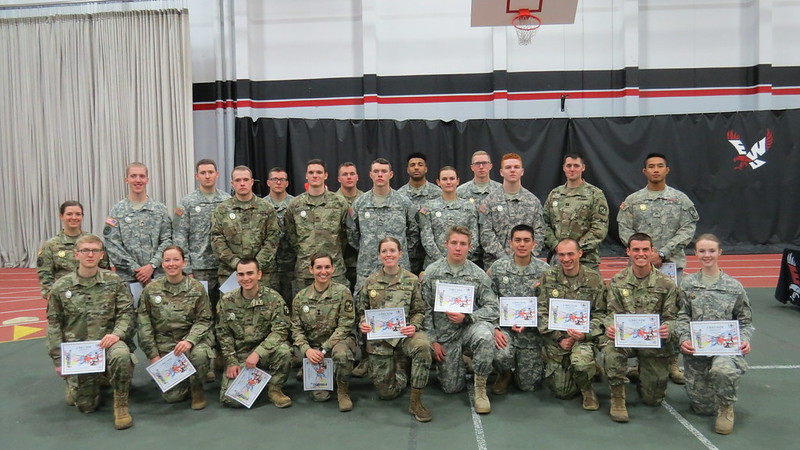
25x EWU ROTC Fighting Eagles Battalion Cadets and 1x Cadre member take a group picture wearing their well deserved German Armed Forces Proficiency Badges.
The Top 5 units overall were:
- EWU with 26x GAFPBs (8x Gold, 17x Silver, 1x Bronze)
- Gonzaga Univ. with 12x GAFPBs (8x Gold, 4 Silver)
- 4-23 IN (JBLM) with 9x GAFPBs (2x Gold, 7x Silver)
- Univ. of Wash. with 8x GAFPBs (5x Gold, 3x Silver)
- Maint. Squadron (Fairchild AFB) with 8x GAFPBs (8x Silver)
Top Individual Basic Fitness Test Scores
10 x 11 Meter Sprint (Male)
- 1. CDT Kai Covey (CWU) – 36 seconds
- 2. (tie) CDT Cesar Guzman (EWU) – 38 seconds
- 2. (tie) CDT Robert Mitchell (UW) – 38 seconds
- 2. (tie) CDT Ian Zipp (UW) – 38 seconds
- 2. (tie) PO3 Travis Rathe (Navy) – 38 seconds
- 2. (tie) CDT Jacob Skelton (Idaho) – 38 seconds
10 x 11 Meter Sprint (Female)
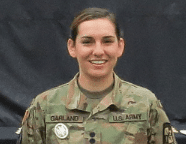
CDT Carley Garland
- 1. (tie) CDT Carly Garland (EWU) – 41 seconds
- 1. (tie) CDT Lindsey Evers (Gonzaga) – 41 seconds
- 3. CDT Madison Woodworth (CWU) – 43 seconds
- 5. (tie) CDT Haley Bent (EWU) – 44 seconds
- 5. (tie) CDT Kylie Crooks (EWU) – 44 seconds
- 5. (tie) CDT Libby Glover (EWU) – 44 seconds
Flexed Arm Hang (Male)
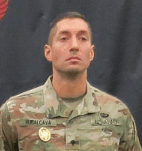
SPC Jerod Rubalcava
- 1. SPC Jerod Rubalcava (1-161 MI) – 111 seconds
- 2. CDT Chad Triplett (EWU) – 101 seconds
- 3. SSG James Martin (C-112) – 97 seconds
- 4. PFC Sawyer Hein (4-23 IN) – 89 seconds
- 5. 2LT John Corey (Idaho) – 88 seconds
Flexed Army Hang (Female)
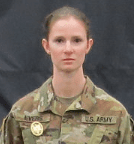
CDT Lindsey Evers
- 1. CDT Lindsey Evers (Gonzaga) – 74 seconds
- 2. CDT Carley Garland (EWU) – 67 seconds
- 3. CDT Kylie Crooks (EWU) – 57 seconds
- 4. (tie) CDT Haley Bent (EWU) – 54 seconds
- 4. (tie) 2LT Vanessa Munro (UW) – 54 seconds
- 5. (tie) CDT Libby Glover (EWU) – 53 seconds
- 5. (tie) CDT Gabrielle Powers (WSU) – 53 seconds
1,000 Meter Run (Male)
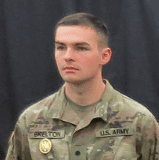
CDT Jacob Skelton
- 1. CDT Jacob Skelton (Idaho) – 189 seconds
- 2. CDT Joshua Lyon (Idaho) – 199 seconds
- 3. (tie) SPC Jerod Rubalcava (1-161 IN) – 200 seconds
- 3. (tie) CDT Jack Bowen (UW) – 200 seconds
- 5. PO3 Travis Rathe (Navy) – 207 seconds
1,000 Meter Run (Female)

CDT Lindsey Evers
- 1. CDT Lindsey Evers (Gonzaga) – 231 seconds
- 2. CDT Carley Garland (EWU) – 234 seconds
- 3. 2LT Vanessa Munro (UW) – 247 seconds
- 4. CDT Madison Woodworth (CWU) – 248 seconds
- 5. CDT Gabrielle Powers (WSU) – 254 seconds
Basic Fitness Test Overall Score (Male)

SPC Jerod Rubalcava
- 1. SPC Jerod Rubalcava (1-161 IN) – 499 points
- 2. CDT Chad Triplett (EWU) – 470.3 points
- 3. CDT Ian Zipp (UW) – 455.3 points
- 4. Robert Mitchell (UW) – 448.3 points
- 5. CDT Grady Gosselin (Gonzaga) – 447.7 points
Basic Fitness Test Overall Score (Female)

CDT Lindsey Evers
- 1. CDT Lindsey Evers (Gonzaga) – 504.4
- 2. CDT Carley Garland (EWU) – 486.1
- 3. CDT Madison Woodworth (CWU) – 429.7
- 4. 2LT Vanessa Munro (UW) – 423.6
- 5. CDT Gabrielle Powers (WSU) – 416.3
Conclusion
Congratulations to everyone that was awarded a German Armed Forces Proficiency Badge. We hope everyone had a great time visiting the EWU campus and spending the weekend in the Spokane area. The EWU ROTC Fighting Eagles Battalion plans to host the GAFPB test again next year in November 2019. For those that didn’t pass or want to earn a Gold badge there will be an opportunity to do so next year. Likewise personnel who have not attended the GAFPB test before are encouraged to do so. Better yet try and beat the best individual scores from this year.
To conclude I want to give special thanks to everyone who made the 2018 GAFPB testing such a success. Planning was led by the EWU ROTC Assistant PMS Captain Gregory Benjamin and assisted by the EWU ROTC Senior Military Science Instructor Sergeant First Class Jason Hennig. Cadet planning for the GAFPB test was led by Cadet Scott Hinshaw and Megan Anderson. We also appreciate all the support from the Washington Army National Guard and the US Army Recruiting command station in Cheney for the GAFPB testing. Another thank you goes to all of our evaluators who worked with SGM Schiller to assure everyone was graded fairly. Further thanks goes to our alumni in particular Mr. Jerry Mellick for helping to sponsor this great event. Finally we want to thank Sergeant Major Ronald Schiller and his wife Katie for flying out to Eastern Washington University to oversee and be the lead evaluator for the GAFPB testing. The extreme amount of professionalism by everyone involved made the GAFPB testing a great success.
Go GAFPB! Go ROTC! Go Fighting Eags!
Award Ceremony Photos
Below are photos from the award ceremony held in the EWU Fieldhouse. Feel free to download and share all these photos with your friends and family.
Gold GAFPB Awardees:

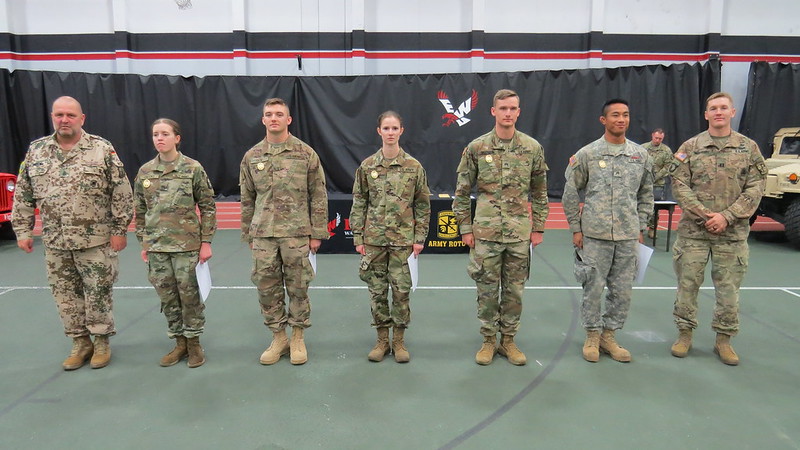
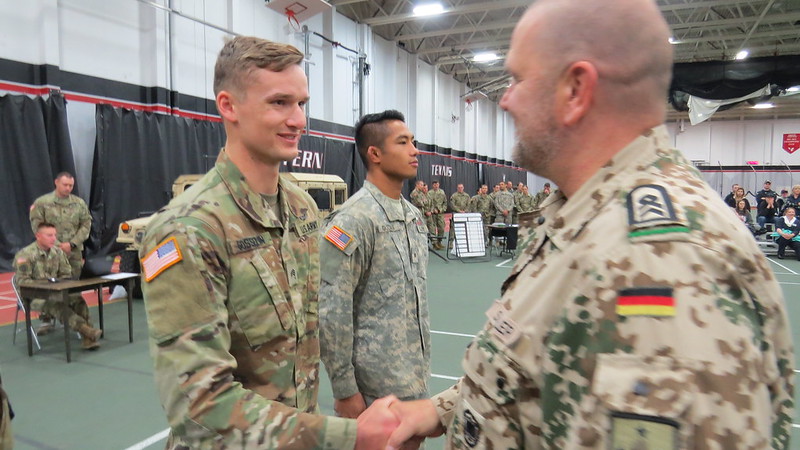
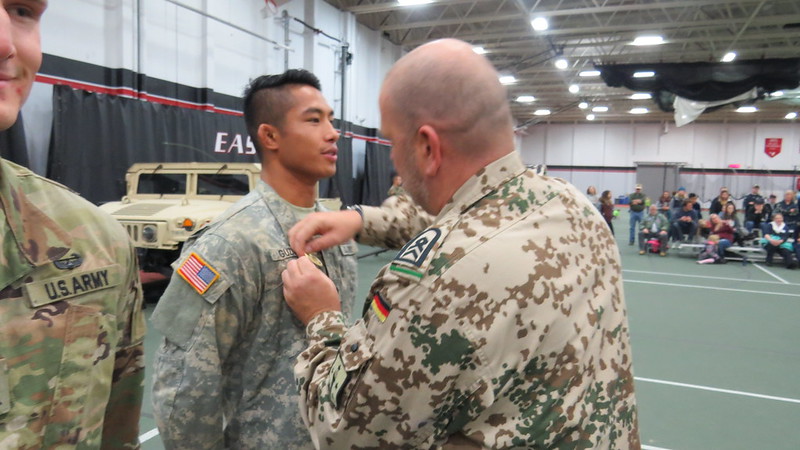

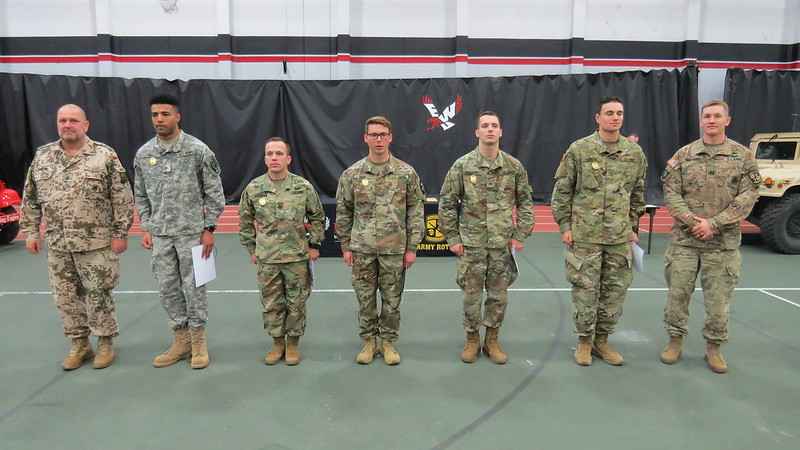
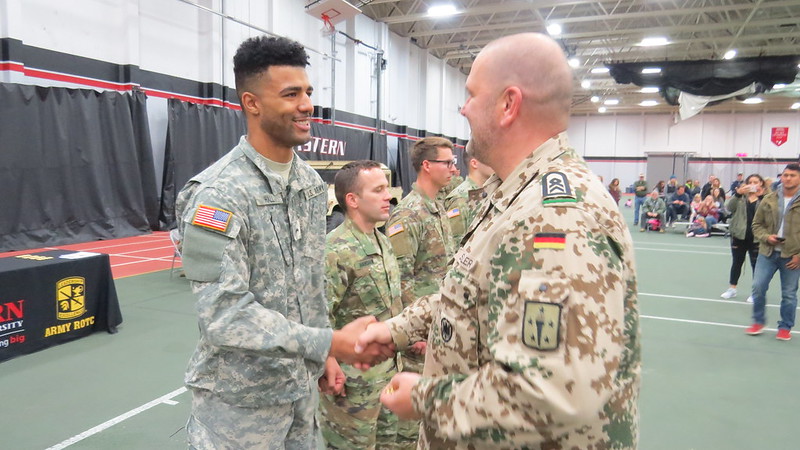
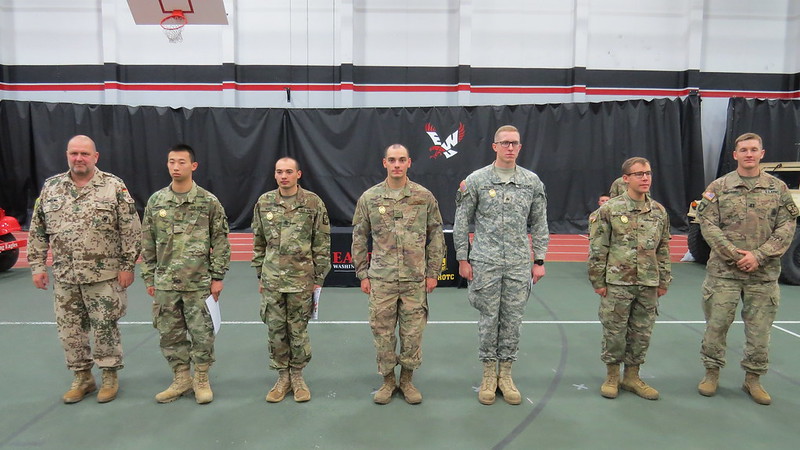
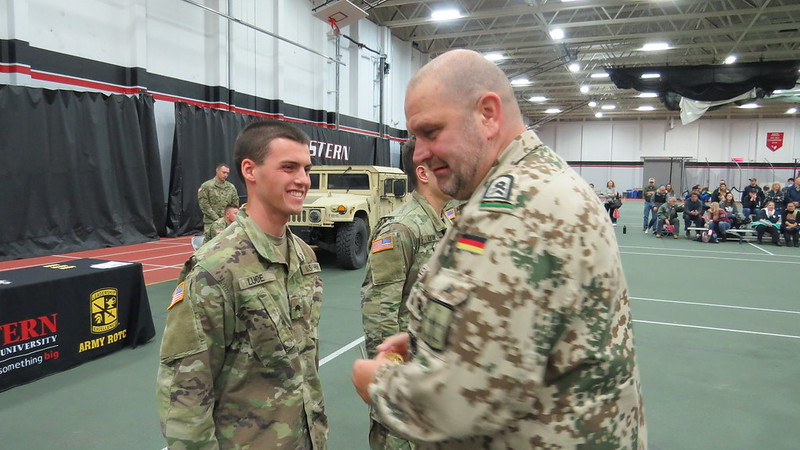


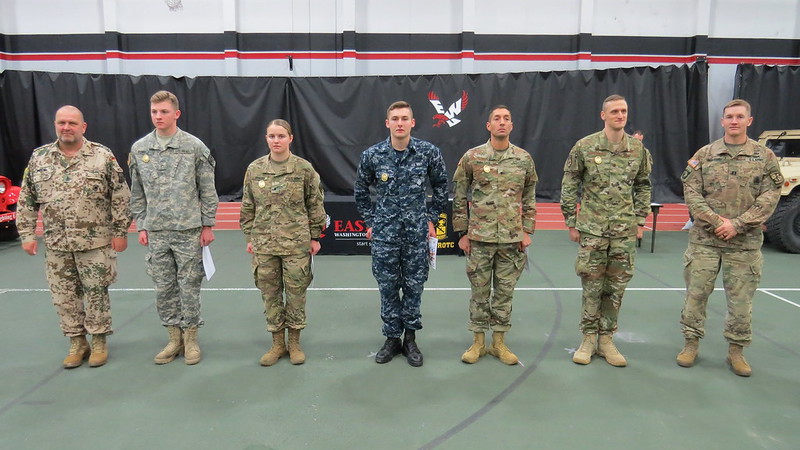

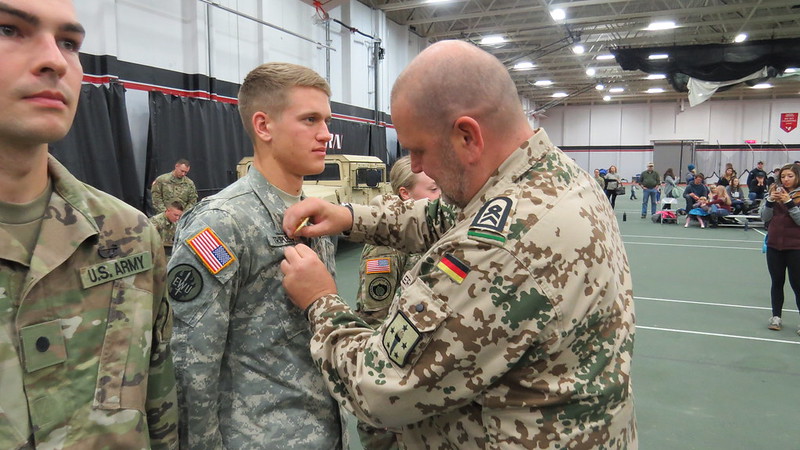
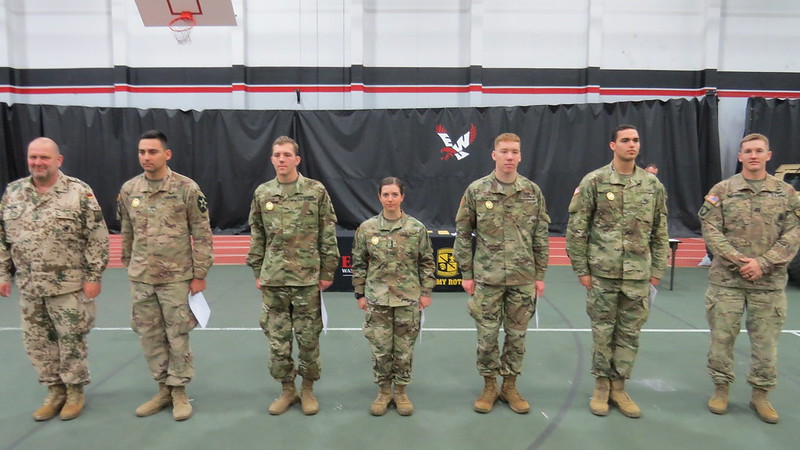
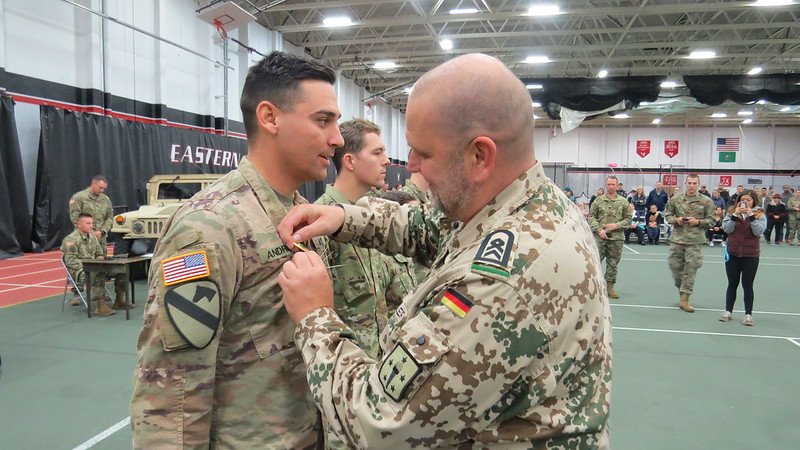
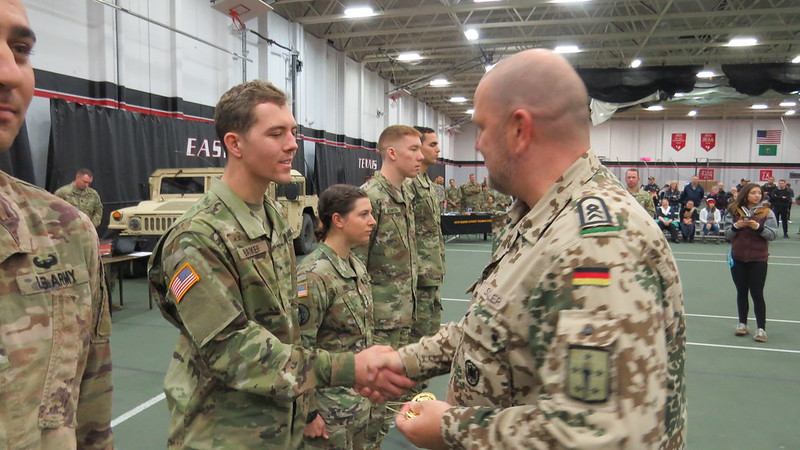
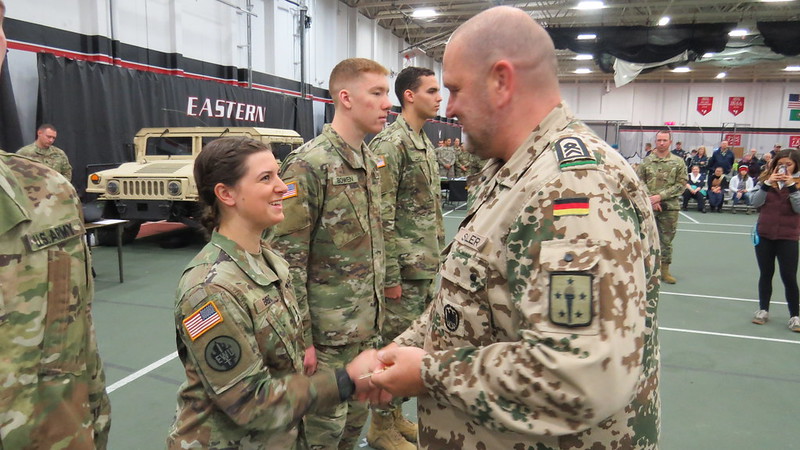
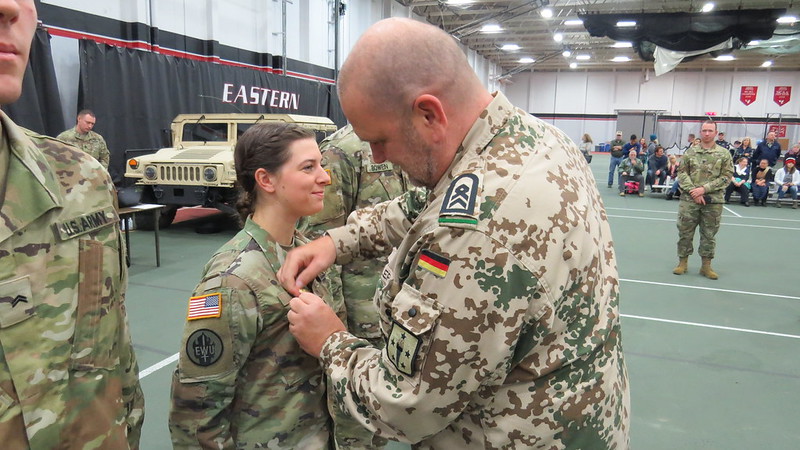
Silver GAFPB Awardees:

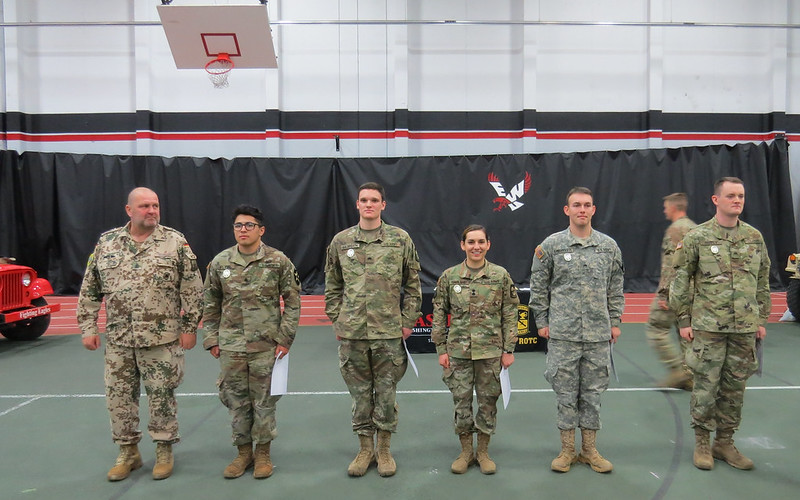
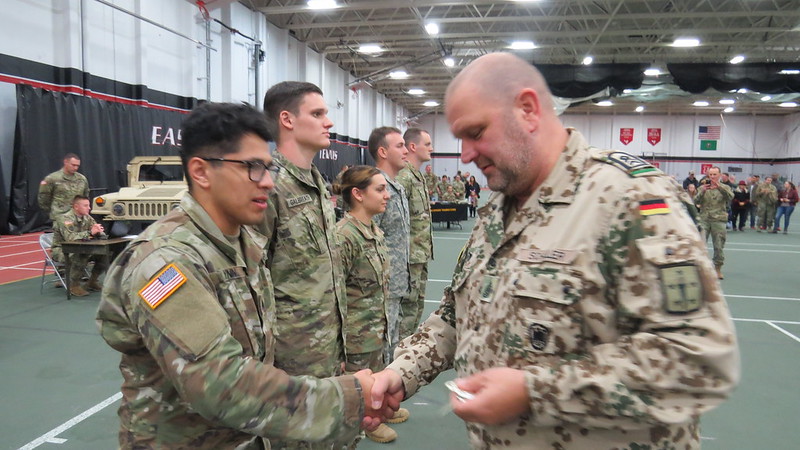
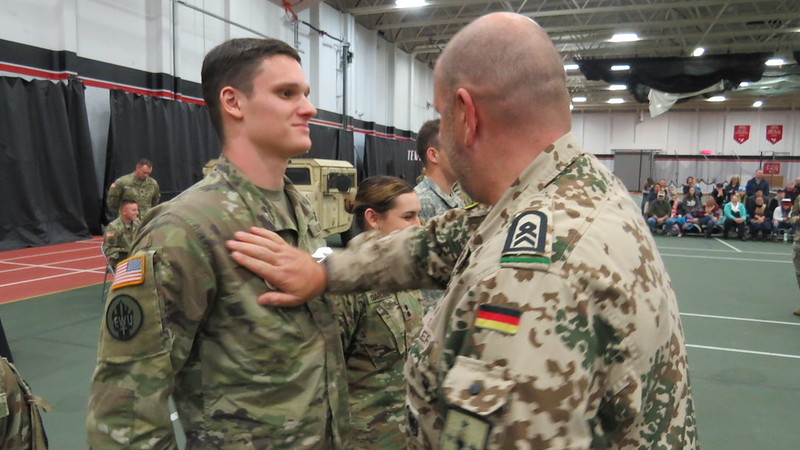
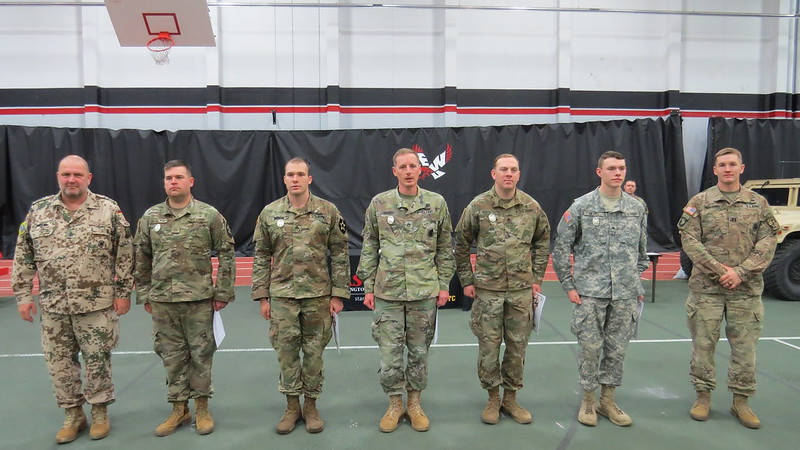

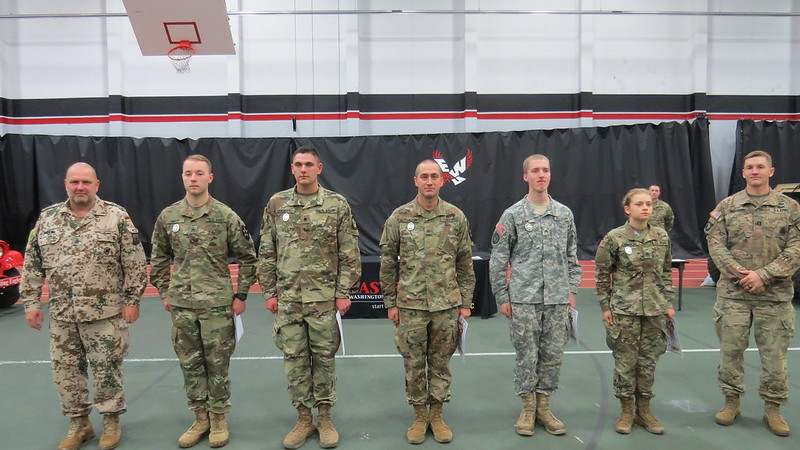
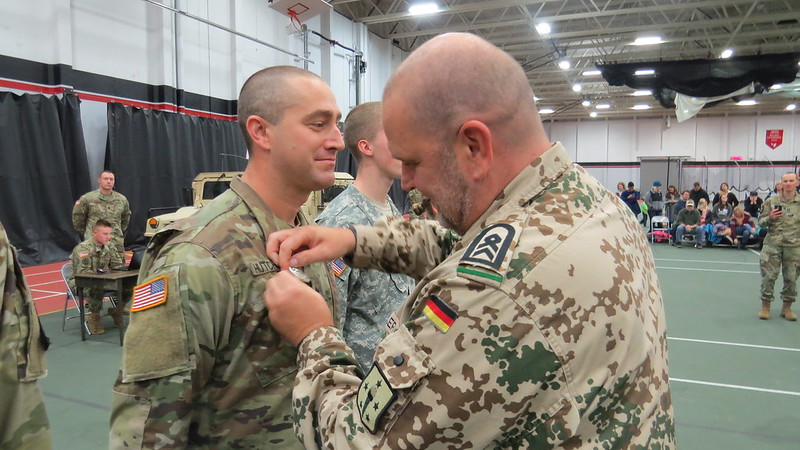
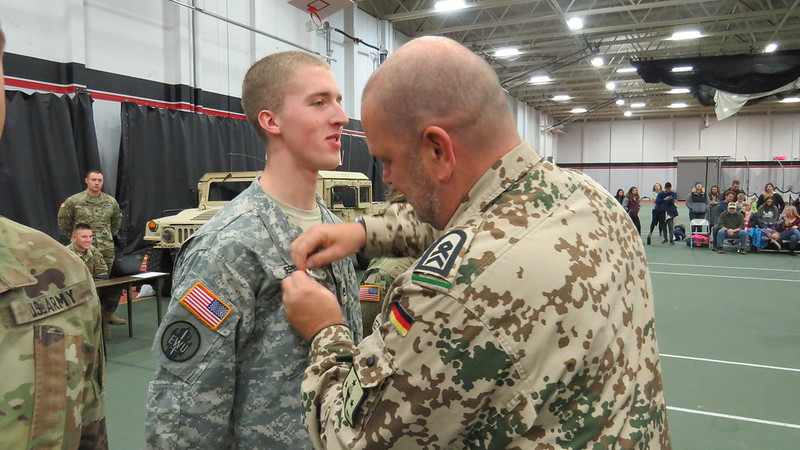
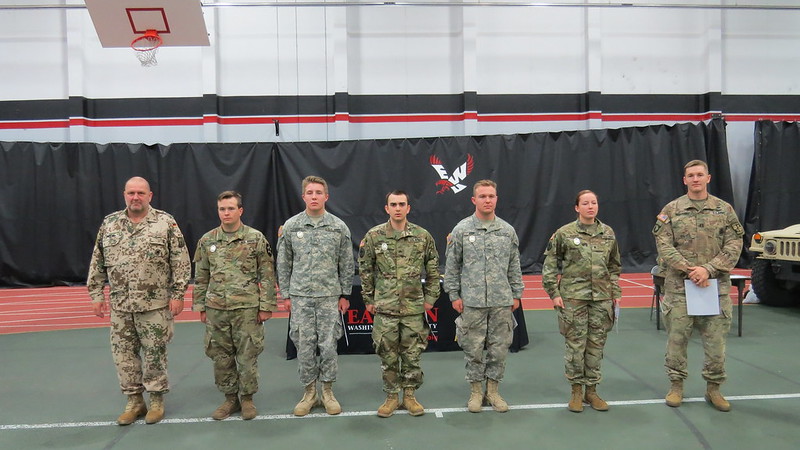
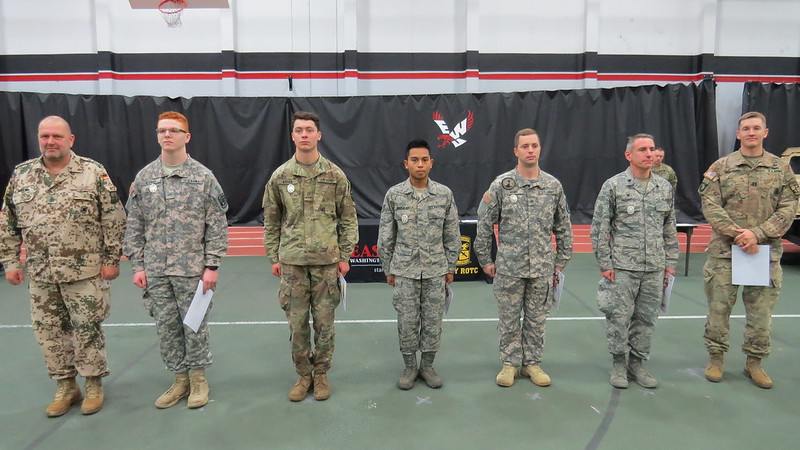
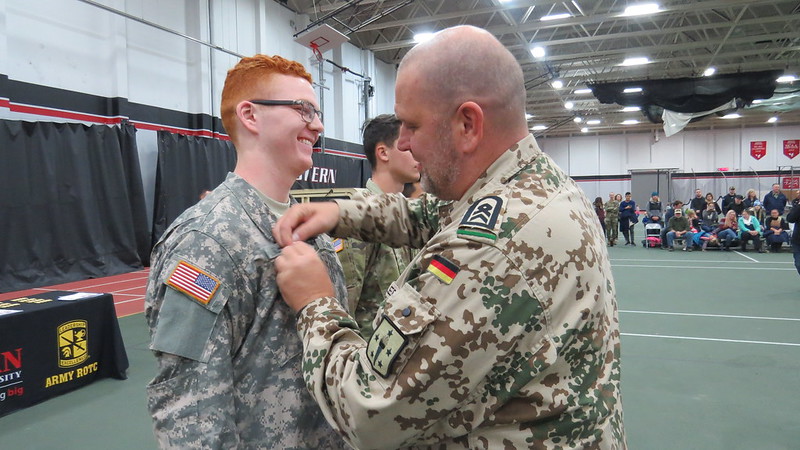
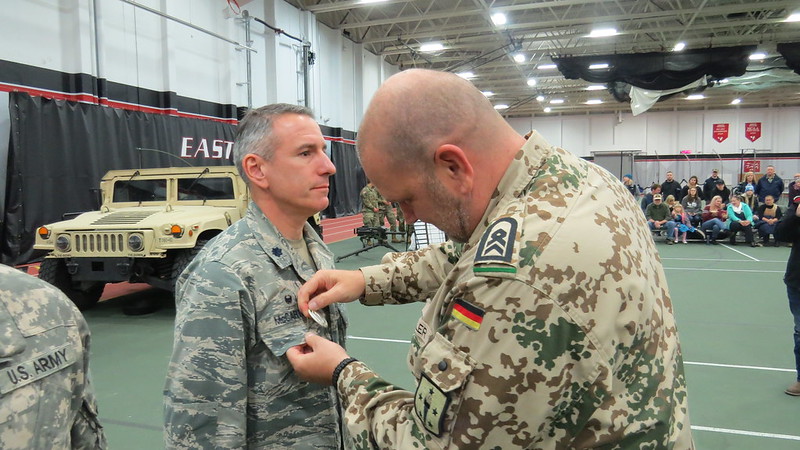
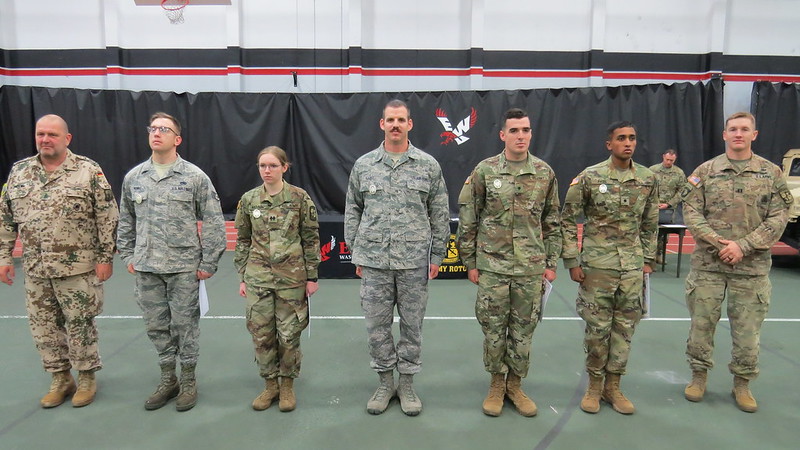
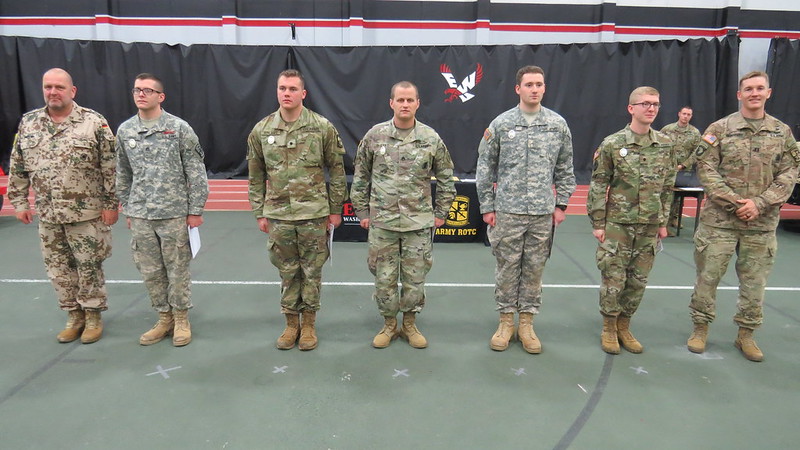

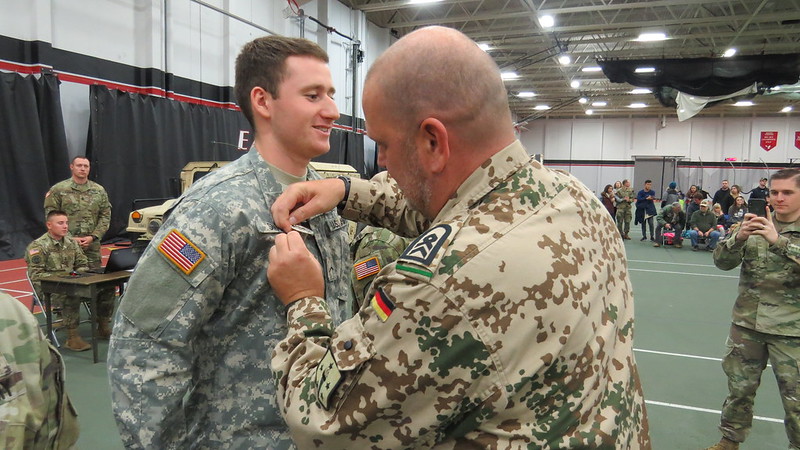
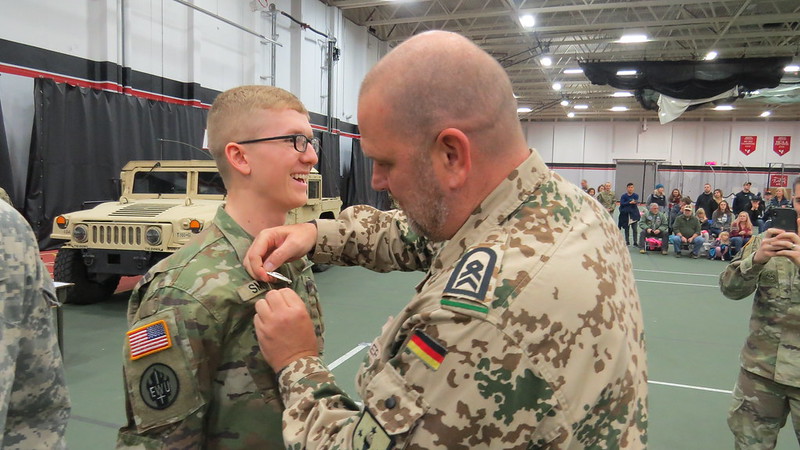
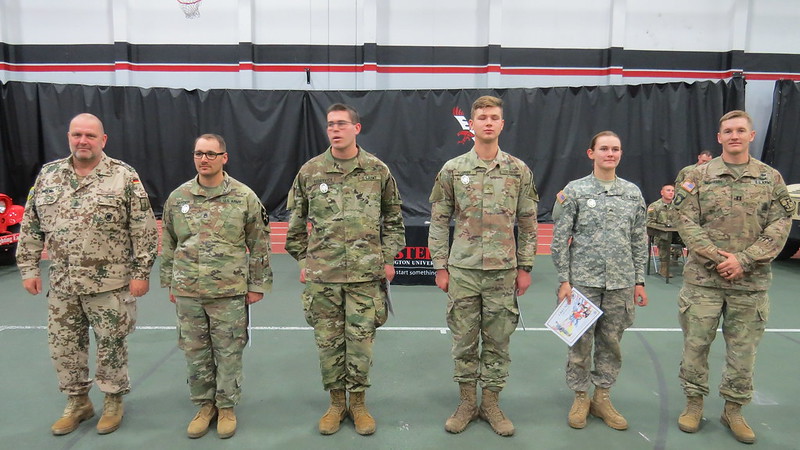
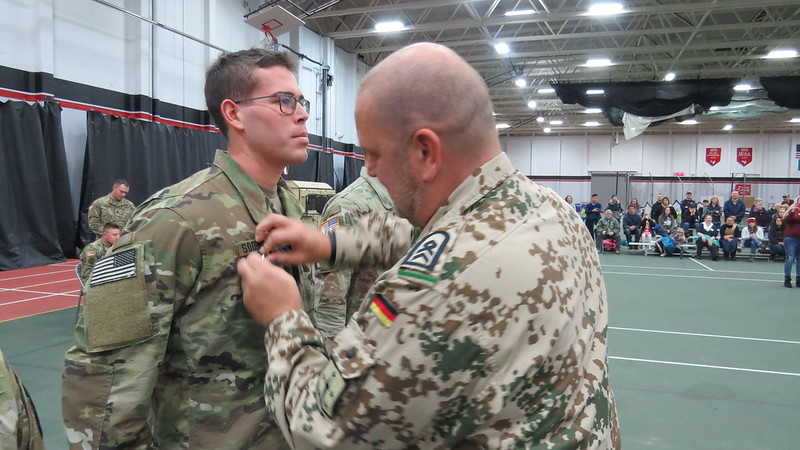
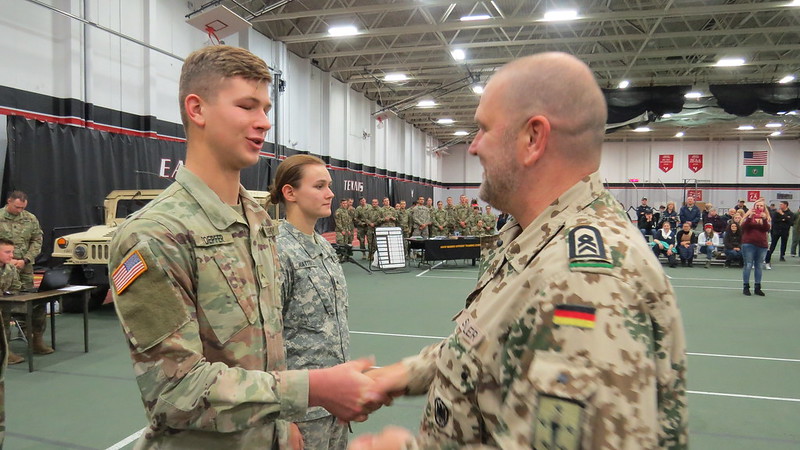
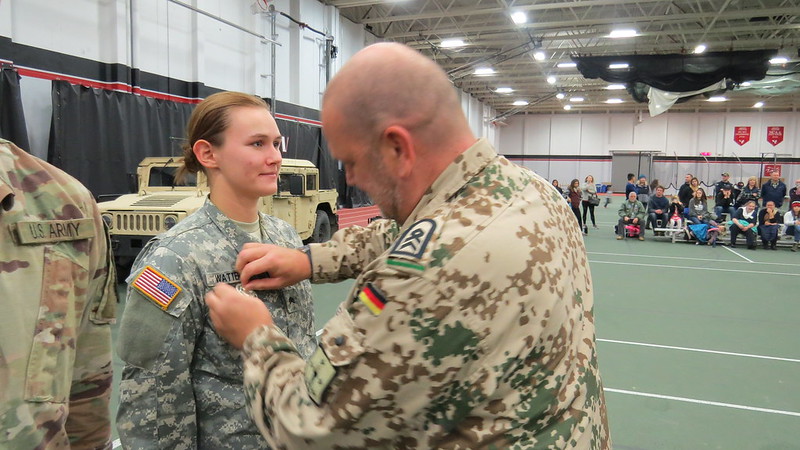
Bronze GAFPB Awardees:

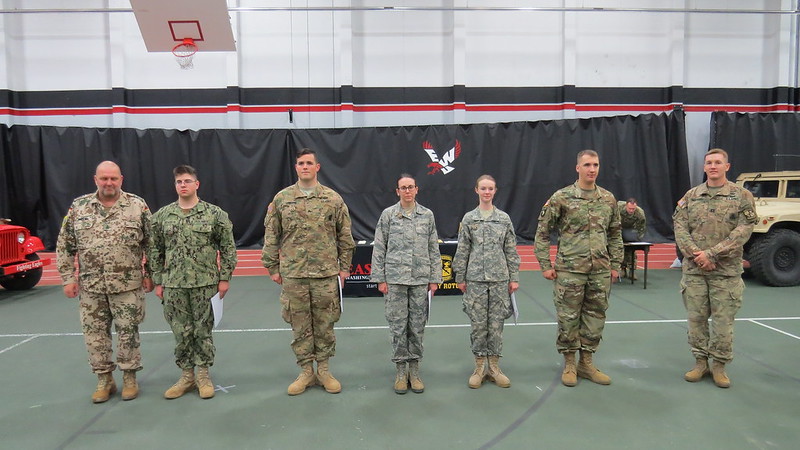
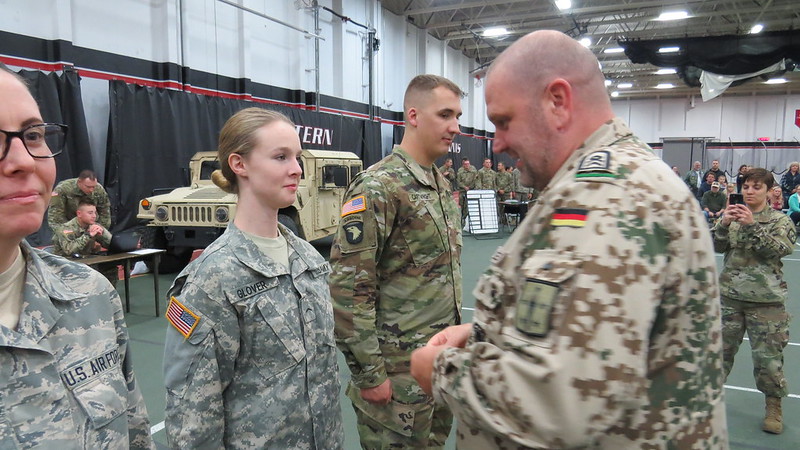

25x EWU ROTC Fighting Eagles Battalion Cadets and 1x Cadre member take a group picture wearing their well deserved German Armed Forces Proficiency Badges.
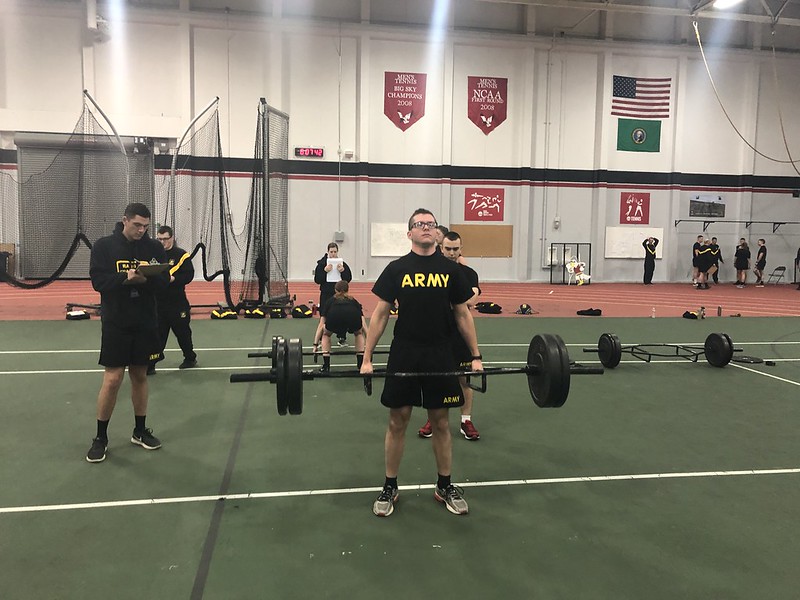

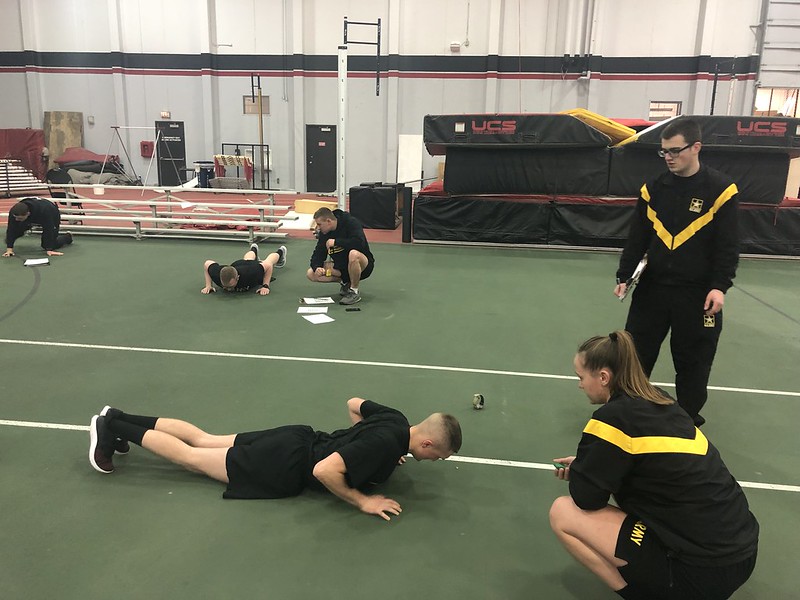
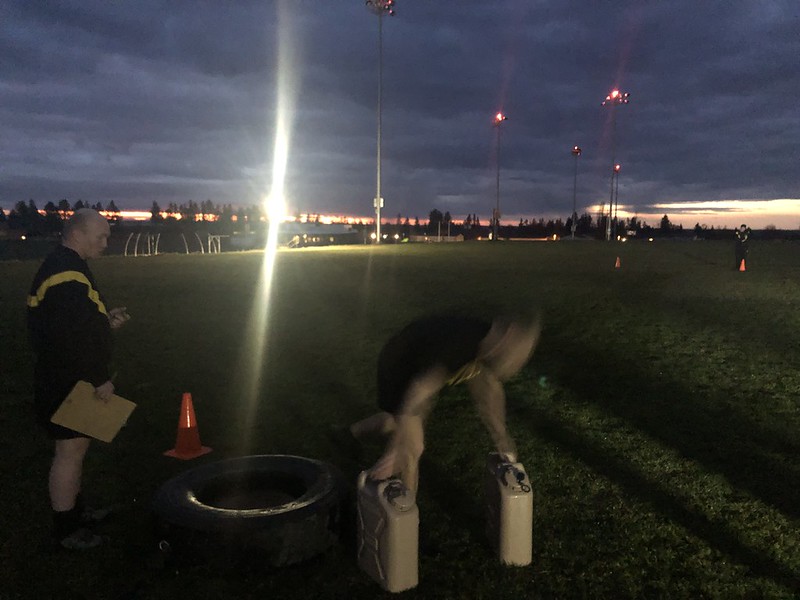
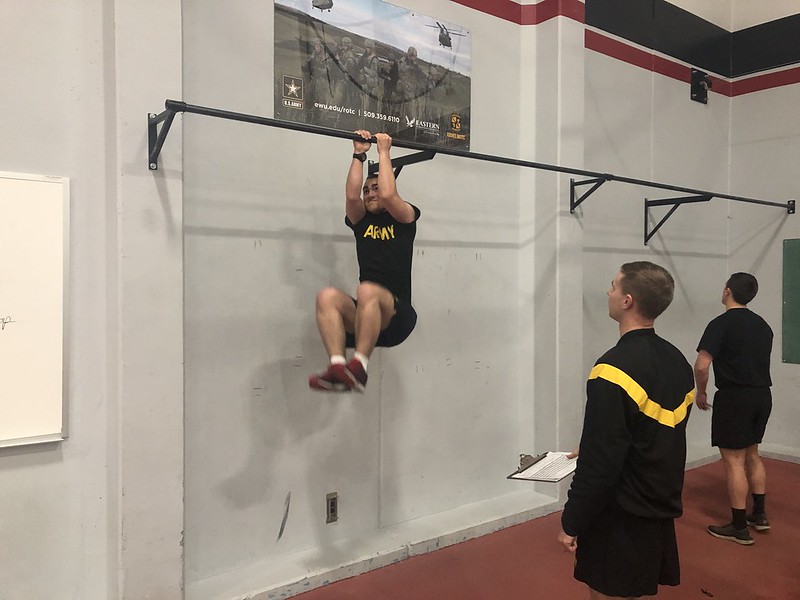
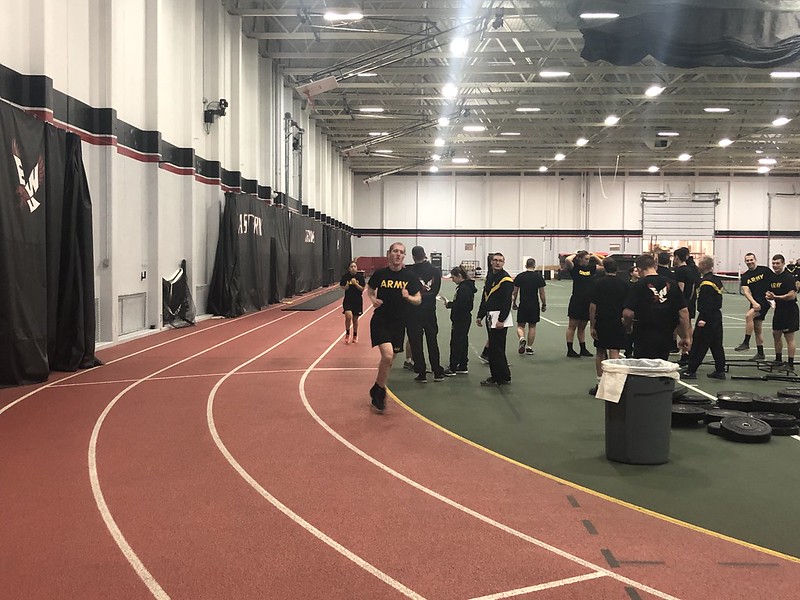
/arc-anglerfish-arc2-prod-mco.s3.amazonaws.com/public/Z6Q3WYOJYNFWTJ7RCHNT6AA7VM.jpg)

